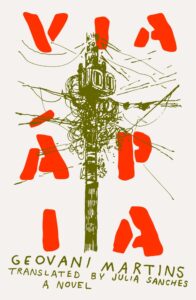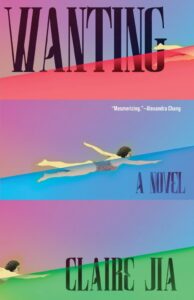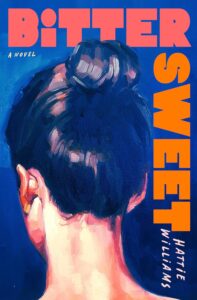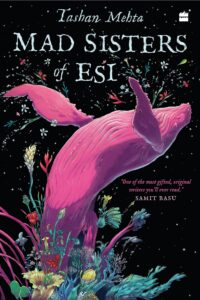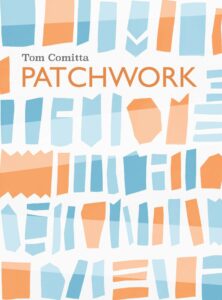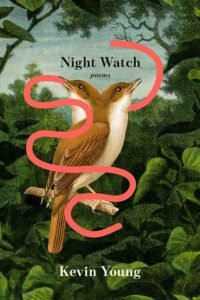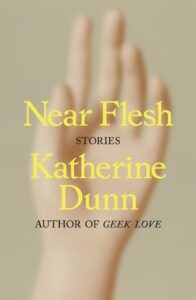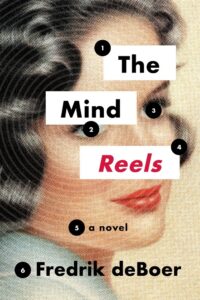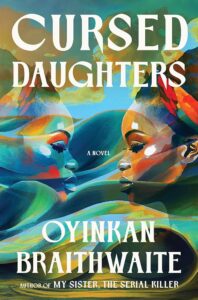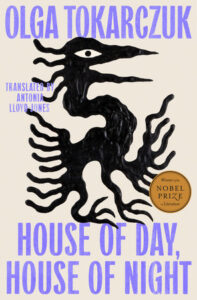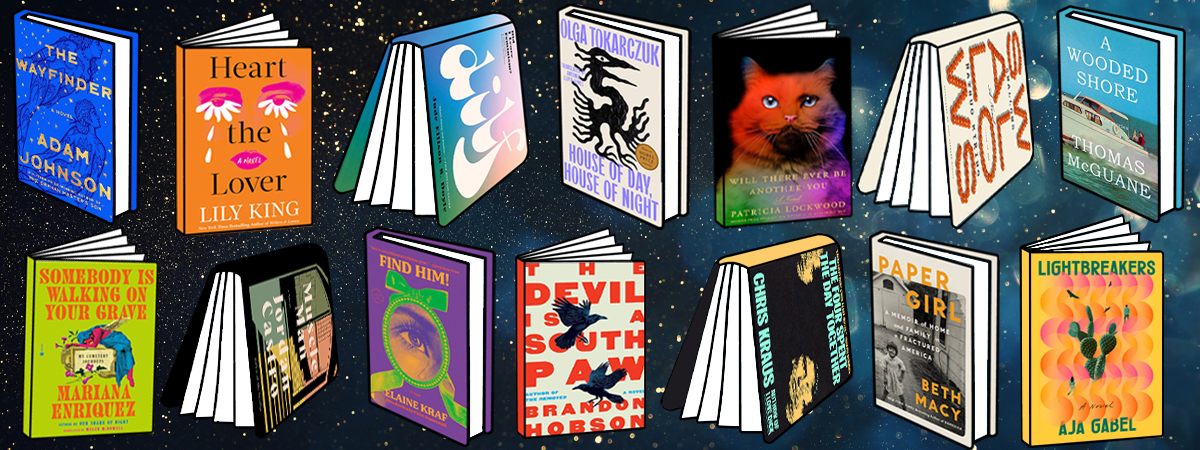
Lit Hub’s Most Anticipated Books of 2025, Part Two
249 Books to Read Before the End of the Year
Time keeps on slippin’ into the future, and the books keep right on coming, no matter what’s going on outside. Want to fly like an eagle? Already finished everything on this list? Check out the books the Literary Hub staff is most looking forward to reading in the back half of 2025 below, and get ready for the revolution.
July
Geovani Martins, tr. Julia Sanches, Via Ápia
FSG Originals, July 1
Not to be all “as someone who was an English minor…” but as someone who was an English minor, I love an epic. An epic set in modern day Rio is even better. Via Ápia follows a group of young people whose lives are upended by a police occupation of their neighborhood. Set just before the 2011 World Cup and Olympics (both of which took place in Rio) and told over the course of a year and a half, Martin’s debut novel explores themes of state violence, resistance, friendship, and life in the modern world. Also, I love Julia Sanches! She’s a wonderful translator. Via Ápia is sure to be great. –McKayla Coyle, Publishing Coordinator
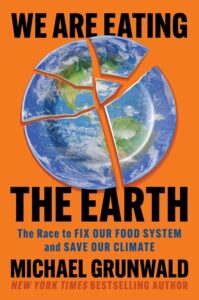
Michael Grunwald, We Are Eating the Earth
Simon & Schuster, July 1
We all know fossil fuels are bad. And we all actually know how to function without them… The problem here is one of politics, not solutions. But did you know that we’re also facing an imminent scarcity threat in terms of land use? That’s right, at current rates, by around the middle of this century, the earth won’t have enough land to feed its ever-growing population—this is also very bad! The good news is that not only does We Are Eating the Earth point out this alarming reality, it also offers some viable solutions. –Jonny Diamond, Editor in Chief
Claire Jia, Wanting
Tin House, July 1
I love a novel with a secret, and Claire Jia’s debut is bursting with them. Wanting follows Ye Lian and Luo Wenyu, high school best friends who drifted apart due to distance and minor YouTube celebrity, as they reunite in Beijing, now in their thirties and grappling with the calcification of their life choices. A gripping exploration of friendship, envy, desire, wealth, ambition, and contemporary Beijing, Wanting is both juicy and substantial. –Jessie Gaynor, Senior Editor, as recommended in our summer reading list

Maris Kreizman, I Want to Burn This Place Down: Essays
Ecco, July 1
Full disclosure: Maris Kreizman is a columnist at this website and I love working with her. She is principled, willing to speak truth to power, and uses her years of experience in the publishing industry to highlight its absurdities and hypocrisies while also celebrating the work of so many of its workers. AND she has a sense of humor. (NB: these things don’t always go together). So am I thrilled that she has a full-blown essay collection coming out that will, among other things, demonstrate to readers “that it’s never too late to become radicalized.” A-fucking-men. –JD, as recommended in our first-half of 2025 list
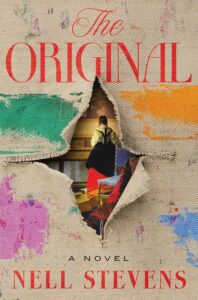
Nell Stevens, The Original
W.W. Norton, July 1
I’ve been proselytizing Nell Stevens’ first book, Briefly, A Delicious Life since it came out a few years ago. It’s one of my all-time favorites, the kind of book that’s always in the back of my mind, that I come back to all the time. So I was beyond excited to find out there’s a new Nell Stevens book coming out this summer! And it’s a total banger! I literally couldn’t put this book down. I thought about it constantly while I was reading it. If that’s not a recommendation, I don’t know what is.
The novel follows a young woman, Grace, who secretly becomes an incredible art forger. Just as she begins to use her talent professionally, a man shows up claiming to be her long-lost cousin—but Grace’s face-blindness makes it impossible for her to know whether he’s really her cousin or not. It’s a novel about fakes and copies and originality and the meaning of art and it has so many delicious layers to unwrap. It’s like F for Fake (1973) by way of Jane Eyre or O Caledonia. It’s thoughtful and haunting and beautifully written. A perfect gothic novel to add to your summer reading list! –MC, as recommended in our summer reading list
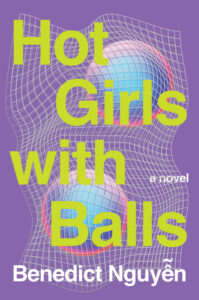
Benedict Nguyễn, Hot Girls With Balls
Catapult, July 1
I’m always a sucker for a good gonzo satire and this one sounds truly delightful: two trans volleyball players, off-court romance and on-court rivalry, interrogations of celebrity and sports and gender… It looks funny as hell and willing to burn it all down, which we frankly need more of in our literature. –Drew Broussard, Podcasts Editor, as recommended in our first-half of 2025 list
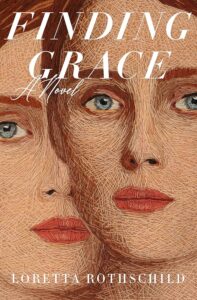
Loretta Rothschild, Finding Grace
St. Martin’s, July 8
The debut novel of Loretta Rothschild revolves around motherhood, identity, and fate. Honor and her husband Tom have a daughter, Chloe, and are trying for another via surrogate: Honor is obsessed with having another child, though Tom is less enthused. One night, they fight, they say terrible things, and then, in a truly shocking twist, Honor and Chloe both end up dead from a horrible accident. Tom is left in grief, with a pregnant surrogate, and very soon he has a baby boy named Henry who he raises alone. In the next twist, a woman named Grace reaches out: she was the egg donor, who shares an uncanny, eerie resemblance to Honor. Tom becomes attached, obsessed, centering his life around this woman who’s tied up in his life in complicated and unsettling ways. It’s a novel that will keep you guessing, both lulled by the realist voice, and shocked by the events that unfold: a fresh and creative novel about duplicity and love by a startling new talent. –Julia Hass, Book Marks Assistant Editor
Hattie Williams, Bitter Sweet
Ballantine, July 8
I love a workplace novel, especially when it’s about someone losing touch with reality. Williams’ debut explores power, desire, and fear, following an assistant in her early twenties who is caught up in an affair with an older writer she’s long idolized. Obsession and vulnerability can be overwhelming and dark, and even more so when it’s between fans and artists. Don’t meet your heroes, and especially don’t hook up with them at work. –James Folta, Staff Writer
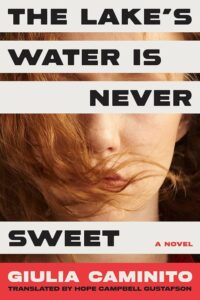
Giulia Caminito, The Lake’s Water is Never Sweet
Spiegel & Grau, July 8
Girlhood, coming of age, fraught female friendships, lakeside towns… say less. Giulia Caminito’s English-language debut follows a young woman, Gaia, whose family moves from a poor suburb of Rome to a beautiful town by a lake in an attempt to escape their poverty. Gaia’s family is falling apart, her parents and siblings all struggling in their own private ways. Gaia builds a tenuous friendship with two local girls and tries to fit into her new life, but she begins to believe she might always be an outsider. And then something terrible happens to her friends, and her fragile new life falls apart. A complex, precise portrait of the loneliness of girlhood, The Lake’s Water is Never Sweet is exactly the kind of book I’m looking for this year. –MC
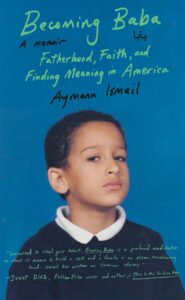
Aymann Ismail, Becoming Baba
Doubleday, July 8
Longtime Slate staff writer Aymann Ismail’s coming-of-age memoir is a funny and deeply moving account of growing up in a Muslim family in the shadow of 9/11. Ismail writes with candor and insight about his young life, and about becoming a father himself. A book about faith, discovery, and reckoning with the things we inherit and those we pass to our children, this is a stunning, vulnerable, and absorbing read. –JG
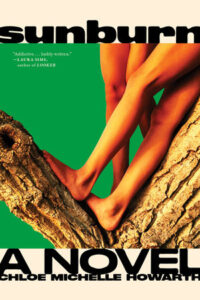
Chloe Michelle Howarth, Sunburn
Melville House, July 8
I’m so happy this book is finally getting a wide release. My bookseller friend and I are always talking about how hard it is to find this book and how he’s spent several bookseller conventions bullying publishers about its distribution. Sunburn is a sapphic love story set in early 90’s Ireland. The novel follows a young woman who has always felt like an outsider. Then one summer, she falls in love with a female classmate and her life becomes much bigger and much more complicated. A story of first love, queer relationships, and the pains of coming of age, Sunburn is a beautiful queer novel. –MC
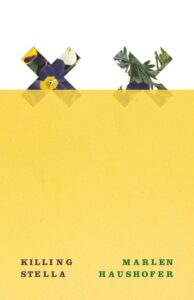
Marlen Haushofer, tr. Shaun Whiteside, Killing Stella
New Directions, July 8
I loved this brutal little novella—as quick (80 pages!) and sharp as a kitchen knife. It’s a story about domesticity, about silence, about love, and yes, about how Stella died. For fans of Fleur Jaeggy and “(picnic, lightning)” and feeling uncomfortable in someone else’s skin. –Emily Temple, Managing Editor
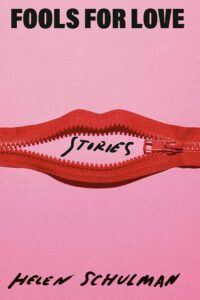
Helen Schulman, Fools for Love: Stories
Knopf, July 8
Schulman’s most recent novel Lucky Dogs had a lot of very fun Hollywood satire, and I’m looking forward to more of her humor in this new collection. These new stories inventively explore relationships at odd moments: a single mother falls for a rabbi as they tear apart a bookstore, a widow finds her dead husband’s sex diaries, and a playwright doubts her marriage to an actor during a performance of a Sam Shepard play. Finding the funny in grounded short fiction is often about pressing on the moments of everyday strangeness until they start to warp, something Schulman is very good at. –JF
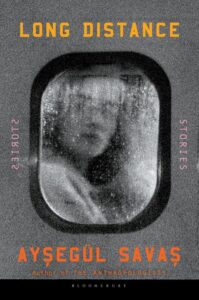
Aysegül Savas, Long Distance: Stories
Bloomsbury, July 8
Over three previous novels, Ayşegül Savaş has developed a reputation for chronicling the banal aches inherent to contemporary life. Her fanbase includes many class acts, like Katie Kitamura, Sigrid Nunez, and just about everybody at The New Yorker. The thirteen stories in this debut collection make a case for her gifts at compression. Some pieces, like “Layover,” have appeared in print before. But a few are fresh off the presses. With this one, I’m looking forward to luxuriating in many well-wrought, elegant sentences. Ideally as I ride a European train. –Brittany Allen, Staff Writer
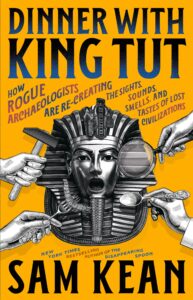
Sam Kean, Dinner with King Tut
Little, Brown, July 8
Apparently there’s a “rogue” collection of archaeologists who’ve dedicated their lives to recreating living history, going beyond visual evocations of the past by recreating the sounds and smells and feelings of ancient civilizations. In Dinner with King Tut writer Sam Kean travels the world alongside these experiential historians as they cook Roman meals, fire Medieval cannons, and even make their own human mummies. (This is how history should be taught, no?) –JD
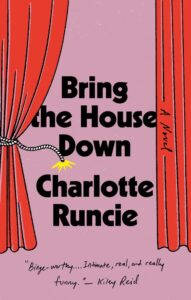
Charlotte Runcie, Bring the House Down
Doubleday, July 8
I’m still a theater kid at heart (no matter how much time continues to pass without auditioning) and there’s nothing like a summer festival—and of all the summer festivals, the Edinburgh Fringe is probably the wildest and most magical. Runcie (a journalist who covered the Fringe for years) gets theater right in this excellent debut novel. It follows a female critic who watches her male colleague suddenly become the focus of an excoriating one-woman-show after he gave it a bad review. It’s a brilliant look at the utter madness that is the Fringe, a deep consideration of criticism and art (and parenthood as a professional), and a fiery reminder that we still have so far to go when it comes to men behaving poorly and getting away with it. Like the title says, it’s time to bring the house down. –DB, as recommended in our summer reading list
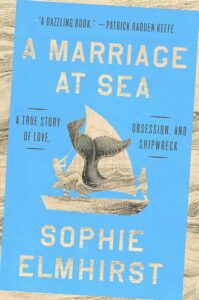
Sophie Elmhirst, A Marriage at Sea
Riverhead, July 8
If the Titan explosion and the Suez Canal obstruction by the Ever Given have taught us anything, it’s that people love seafaring drama. A Marriage at Sea is the true story of a married couple who leave everything behind to sail around the world and succeed for nearly a year before their boat sinks. The couple is then stranded together on a rubber raft. Rescue is improbable. This goes on for months. Months! Nautical drama, martial tensions—have you clicked away to pre-order the book already? –Calvin Kasulke, Associate Publisher, as recommended in our first-half of 2025 list
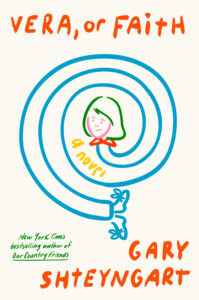
Gary Shteyngart, Vera, or Faith
Random House, July 8
Shteyngart’s new novel, his first since 2021’s Our Country Friends, is the story of a very volatile family in a very volatile America, filtered through the eyes of a child, who just wants to be loved (the most Shteyngartian of motivations, and the most human). “In its swirls of emotion, its humor, its pathos, and the unsparing humanity of its vision, Vera, or Faith is like some fabulous, hitherto-unknown creature that’s been let out of its bottle and set free,” remarks Michael Cunningham. Sounds about right. –ET, as recommended in our first-half of 2025 list
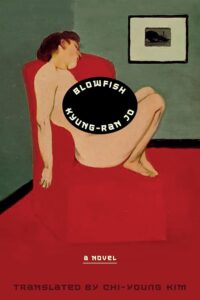
Kyung-Ran Jo, Blowfish
Astra House, July 15
When I see a novel described as “atmospheric” and “melancholic” I’m immediately foaming at the mouth to read it (which could mean nothing, etc). Jo’s novel is about a woman who decides to kill herself by preparing and eating a deadly blowfish. If you’re unwell in the same ways I am, I know you’re already going “ooo okay!” and preordering this book. If you aren’t having that reaction, we have nothing in common. I can’t wait to get my hands on this strange, dark, lovely novel. –MC
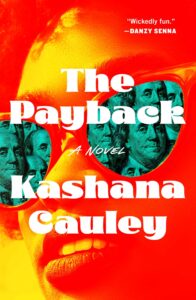
Kashana Cauley, The Payback
Atria, July 15
Summer is heist season. Hear me out. At least on the Eastern Seaboard, everyone–excepting the rich–is dangerously hot and filled with gripes. Desperation creates powder-keg situations for working class heroes. Think Do The Right Thing, or Dog Day Afternoon.
Kashana Cauley’s The Payback, which comes out this August, unfolds against that heist-y weather. The speculative novel follows the down-on-her-luck Jada Williams, an under-employed Glendale mallrat who was recently fired from a more glamorous post in the film industry. Working the floor at Phoenix, a fast-fashion house after the Gap, Jada struggles to make ends meet. Especially when the not-at-all-hyperbolic Debt Police start calling. Her subsequent revenge looks as fun and swift as the most righteous robbery. –BA
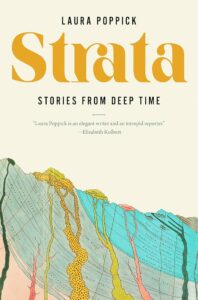
Laura Poppick, Strata: Stories from Deep Time
Norton, July 15
The history of the geological earth is there for all of us to read; it can be found in the layers upon layers of compacted evidence created by eons of change—aka, strata—that reveal so many of our planet’s tumultuous changes. From asteroid impacts to ice ages, oxygen booms to planetary plant takeovers, science journalist Laura Poppick goes in search of these geological archives, alongside the scientists who understand them best. –JD
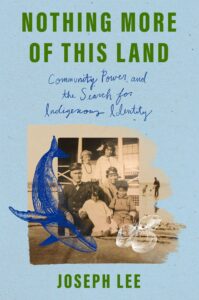
Joseph Lee, Nothing More of This Land
One Signal, July 15
In this historiography-cum-memoir Joseph Lee recounts the displacement of his people, the Aquinnah Wampanoag, from their traditional home of Martha’s Vineyard, and how difficult it can be for indigenous communities to maintain unity—and continuity—in the face of 21st-century pressures. But as Lee illustrates, there is a new generation of Native activists prepared to fight the good fight. –JD
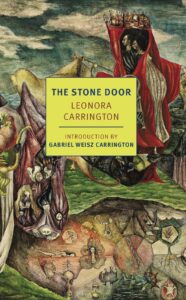
Leonora Carrington, The Stone Door
NYRB, July 15
The Stone Door opens in a forest, on a house composed of competing styles, “as if the architect had wrought a terrible revenge on his school days.” It’s a fitting opening image for a book that is also a pastiche of styles, strange and tough to characterize with the epic sweep of myth, the significance of parable, and the magical logic of a fairy tale. As a child, Carrington was raised on fairy tales in an English manor house and as an adult was caught, tragically at times, in the upheaval of WWII Europe and in the constant company of Surrealists. All of these influences swirl in the book, and for such a short novel, The Stone Door morphs a lot. It’s impossible to anticipate where Carrington will go: the adventure can be grounded, as in the smaller, domestic scenes, or more grand, like when the main character must negotiate with a giant who wants to skin him. The Stone Door is a fascinating and unsettled book, that always seems to be teetering on the edge of something dark, something mad: “Hardly daring to touch what I want to say, yet knowing that if I had enough space around me it would be a piercing shriek.” –JF, as recommended in our summer reading list
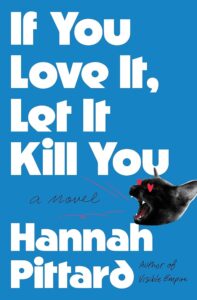
Hannah Pittard, If You Love It, Let It Kill You
Henry Holt, July 15
Did you read the dishy NY Mag story about those four writers whose relationships all exploded? Of course you did. You’ve maybe even read Hannah Pittard’s viral essay in the Sewanee Review, the one that turned into her memoir-of-sorts, We Are Too Many. Now, she turns a fictional eye towards the aftermath of all of that, following a Hana P in Lexington KY going through a mid-life crisis after finding out her ex is publishing a novel with a none-too-flattering version of her in it. I can’t wait. –DB, as recommended in our first-half of 2025 list
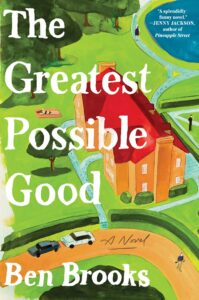
Ben Brooks, The Greatest Possible Good
Avid Reader Press, July 15
You’ll not forget the Candlewicks once you meet them! This splendid, wry satire is about a wealthy family, self-important and confident in their morality, whose blithe and bumptious existences are thrown into disarray when their father clandestinely decides to give all their money to charity, and so (in their opinions) completely destroys their lives. Droll and all-too-real. –Olivia Rutigliano, Editor, as recommended in our first-half of 2025 list
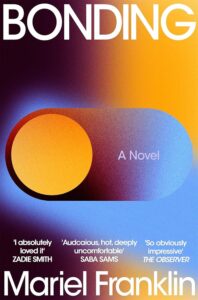
Mariel Franklin, Bonding
FSG, July 22
This debut novel was feted on its English release last summer, and I’m so jazzed for its hop across the pond. Closely following the Millennial Mary over a year of career and courting chess moves, the story builds to an ice-cold, laser-focused critique of two industries structuring modern love: Big Pharma and Big Tech. People have compared Franklin’s coolly satirical eye to Houllebecq’s, but I actually thought of Gatsby in this classically structured cautionary tale about a decadent age. I’m betting this one will be the big cool girl beach read of the summer. –BA
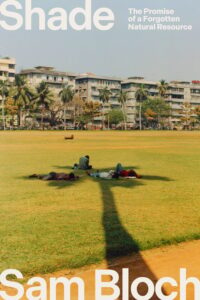
Sam Bloch, Shade: The Promise of a Forgotten Natural Resource
Random House, July 22
One of the blurbs for this hybrid work of science, history, urban design, and social justice describes the book as, “my favorite kind of book: a history of something seemingly niche that secretly explains the entire world.” I, too, love these kinds of books, and as an Irishman whose natural enemy is the sun, I’m particularly intrigued by the premise. On our rapidly warming planet, as we suffer through yet another dangerous heatwave, a book that explores the history and necessity of this staple of human existence sounds like essential reading. –Dan Sheehan, Book Marks Editor in Chief
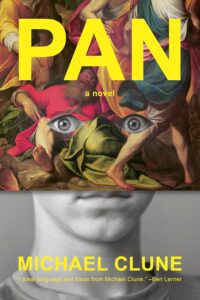
Michael Clune, Pan
Penguin Press, July 22
Though he works in many modes, Clune is best known for his 2013 cult memoir about heroin addiction, White Out, which was recently reissued by McNally Editions. In his first novel, he investigates panic, which when it manifests in the life of a teenage boy, takes on psychedelic, and then cosmic, and then, perhaps, divine proportions. The book explodes the central dilemma of the panic attack—what is real? and then, whether real or illusory, on what plane can I approach?—and wraps it all up in a moving coming-of-age story. –ET, as recommended in our summer reading list
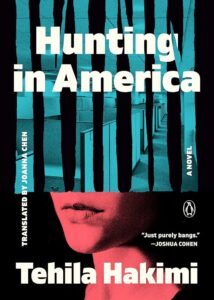
Tehila Hakimi, tr. Joanna Chen, Hunting in America
Viking, July 22
Tehila Hakimi’s award-winning Hunting in America is available in English for the first time: an enigmatic puzzle of a novel with a wry, mesmerizing voice, it goes down easy in a one-sitting read. Not to say that it’s gentle, or comfortable. It’s sly, and eerie, and keeps you guessing, and on edge, but in a way where you can’t stop turning the pages. It centers around a woman who relocates from Israel to America for her corporate job, and while reckoning with her new country, her new office, her new mundanities, develops a fixation on hunting. Stalking prey, feeling stalked herself, feeling the weight of a country and its expectations, it evokes Samantha Schweblin and Han Kang in its surreality and daring specificity. Pervasively unsettling, both too alien and too familiar, Hunting in America coolly illustrates the complicity that both Israeli and Americans have in a gun-touting culture, and the insidious ways that violence can seep into our consciousness. –JH, as recommended in our summer reading list
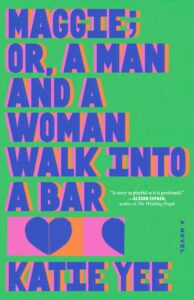
Katie Yee, Maggie; or, A Man and a Woman Walk Into a Bar
Summit Books, July 22
I can’t say I went into Katie Yee’s debut novel as an unbiased reader. I had the pleasure of reading Katie’s work for years when she was an editor at this very website. Still, personal relationships aside, I feel confident in recommending Maggie; Or, A Man and a Woman Walk Into a Bar to anyone who craves the embrace of a novel that perfectly weaves grief with warmth and wit. We follow the novel’s narrator as she absorbs the one-two punch of her husband’s affair (for which he apologizes, but does not ask for forgiveness—so, divorce) and a breast cancer diagnosis, while she meditates on the quotidian joys and betrayals of relationships, the strangeness of parenthood, the loss of health and of identity, how to nail storytime, and what a joke even is. Funny, sad, kind, and deeply tender, this is a book that goes down like a treat, and stays with you the way only the wisest novels can. –JG, as recommended in our summer reading list
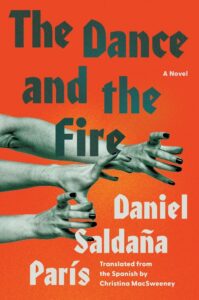
Daniel Saldaña París, tr. Christina MacSweeney, The Dance and the Fire
Catapult, July 29
In Saldaña Paris’s ambitious new novel, three friends return to Cuernavaca, Mexico, a city on fire—wild fires and, soon enough, a kind of hysterical dancing compulsion overcoming the population. –Dwyer Murphy, as recommended in our first-half of 2025 list
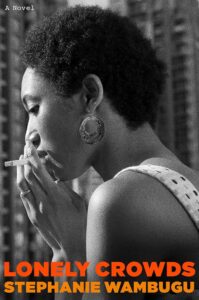
Stephanie Wambugu, Lonely Crowds
Little, Brown, July 29
This novel follows two friends, Ruth and Maria, over the course of a twisty, decades-long relationship. The pair of outsiders initially bond over being the rare scholarship students at their chilly New England Catholic school. When they both wind up pursuing art dreams in New York, competition tests their bond.
This much-hyped debut from a young writer-to-watch enters one of my favorite canons (buds-in-the-city-books) and is set in one of my favorite milieus (a 90s New York art world). Call me seated. –BA, as recommended in our first-half of 2025 list
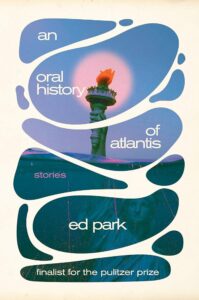
Ed Park, An Oral History of Atlantis: Stories
Random House, July 29
The long wait between Personal Days and Same Bed Different Dreams is a thing of the past—here comes another Ed Park joint, this time a story collection! Park was a Pulitzer finalist for Same Bed and he brings that same genre-bending, polyphonic style to this collection of stories about modern life and all its perfectly mundane strangeness. –DB, as recommended in our first-half of 2025 list
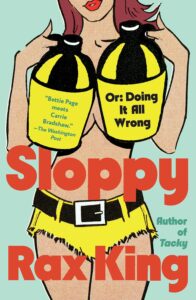
Rax King, Sloppy: Or: Doing It All Wrong
Vintage, July 29
King is an excellent essayist and critic, and her work is never boring or stale: anyone who’s read her at MEL, Welcome To Hell World, or in her previous collection Tacky knows how funny and sharp her writing is. Her new collection of personal essays takes on bad behavior by looking inward, with examinations of sobriety, waiting tables, Neopets forums, and shoplifting from Brandy Melville. King has a blogger’s punch and an essayist’s analysis—her dexterous writing is intelligent, observant, and very, very funny. –JF, as recommended in our first-half of 2025 list
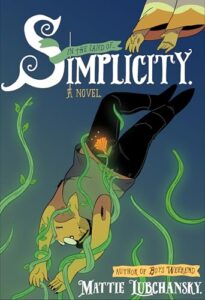
Mattie Lubchansky, Simplicity
Pantheon, July 29
Where Mattie Lubchansky’s remarkable debut graphic novel Boy’s Weekend followed its trans protagonist’s attempt to navigate a bachelor party in a speculative near-future, Simplicity finds us a bit further into a dystopian-ish setting. Lucius Pasternak, a municipal employee of the New York City Administrative and Security Territory, is dispatched to study the people of Simplicity, an upstate utopian commune settled over a century ago, back in the 1970s.
While living among the residents of Simplicity, the uptight Pasternak struggles to adapt to the commune’s highly liberated attitudes towards sex and nudity; to further complicate matters, someone—or something—is hunting the people of Simplicity. Lubchansky’s sophomore graphic novel explores the limits of utopian separatism, the downsides to trying to work against an oppressive system from the inside, and how communities can defend themselves and win. –CK, as recommended in our first-half of 2025 list
August
Tashan Mehta, Mad Sisters of Esi
DAW, August 5
The publicity copy calls Mad Sisters of Esi a cross between Piranesi and Calvino and honestly that’s enough for me. Add in a dash of multiversal story-centric adventure and really what more do you need? The book has a ton of hype behind it, as it was originally published by HarperCollins India in 2023 and won a handful of awards at the time—but I’m avoiding learning anything else about it, because it looks like one of those truly joyful adventures best discovered on the page. –DB
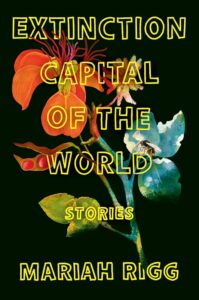
Mariah Rigg, Extinction Capital of the World: Stories
Ecco, August 5
I love collections of connected short stories and intergenerational narratives. Extinction Capital of the World promises both, but what really excites me about the collection is its consideration of imperialism and environmental destruction in Hawai’i, and how those conditions intersect with the lives of the people who witness their consequences every day. –Oliver Scialdone, Community Editor
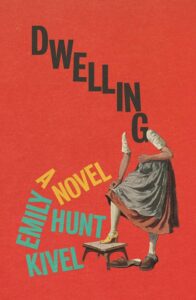
Emily Hunt Kivel, Dwelling
FSG, August 5
I love a fairytale of late-stage capitalism. A world where New York City renters are evicted from their homes en masse doesn’t feel so fantastic to me, but pair a not-so-farfetched dystopia with magic and wonder in a weird little town, and I’m sold. –OS
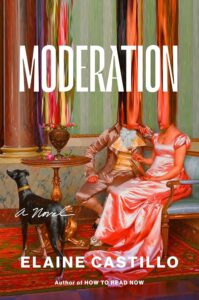
Elaine Castillo, Moderation
Viking, August 5
I was just starting to wonder how contemporary fiction might metabolize the post-pandemic hellscape our tech overlords are actively coding into being. Thanks to Elaine Castillo (and a few other cool cats on this list), I can queasily say the search is over. This very modern romance-meets-systems-novel kicks off at Fairground, the world’s foremost virtual reality content provider. Our hero, Girlie Delmundo, is a Kool-Aid drinking drone with big ambitions. Epigraphs from Moby Dick and Terminator herald a high-octane industry satire. And I’m a thrilled new fan of Castillo’s bracing, gleefully acerbic voice. –BA
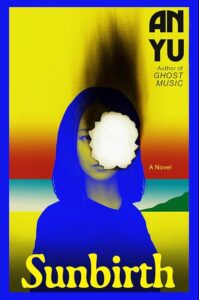
An Yu, Sunbirth
Grove, August 5
Yay new An Yu! As an enjoyer of Ghost Music, An Yu’s previous novel, I’m very excited for this one. Yu works at the intersection of vibey and surreal, which is an intersection that I’m obsessed with. Sunbirth centers on two sisters who live in a small village where the sun is shrinking. One sister runs a traditional medicine pharmacy while the other works for a fancy wellness center. As the sun becomes smaller and smaller, the already struggling village tries to accept its imminent mortality. Then the Beacons appear—people whose heads are replaced by bright, miniature suns. What does this mean for the fate of the town? I love Yu’s atmospheric sensibilities and her quiet, character-driven work. I’m looking forward to getting my hands on this one. –MC
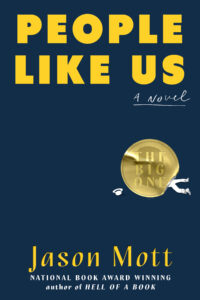
Jason Mott, People Like Us
Dutton, August 5
I’m super pumped for this meta, allegedly autobiographical novel following two Black writers working in very different ways. (One hero’s a feted author whose global book tour comes to include supernatural curveballs, the other is struggling to write an elegy in the wake of a school shooting.) Picking up in a universe near the one represented in Mott’s last book, the award-winning Hell of A Book, People Like Us involves the same tonal gymnastics. Mott’s writing is electric. Sentences zing with the energy of darts. But all that riz ultimately serves to convey a lacerating critique of American gun violence. File this one under “genre-bending tour-de-force.” –BA

Eliana Alves Cruz, tr. Benjamin Brooks, Solitaria
Astra House, August 5
Solitaria is a novel about class, liberation, and colonial legacies from a celebrated Afro-Brazilian author. Eunice works as a live-in maid in a penthouse apartment in Brazil along with her daughter, Mabel. Eunice has perfected the art of being invisible, but when tragedy strikes, she must decide whether she can continue to ignore the history of colonial violence that she’s spent so long avoiding. I’m always interested in books that offer a new perspective on complex issues, and Solitaria does just that. –MC
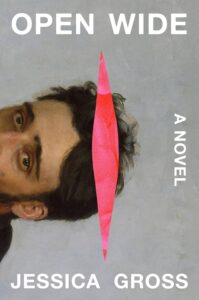
Jessica Gross, Open Wide
Abrams, August 5
For a while, I thought that the promised derangement in Open Wide was going to be the regular kind: a woman who becomes much too obsessed with the man she’s dating, to the point where she ruins everything. (Is that what happens? It’s debatable.) But without giving anything away, because I am glad that I was not prepared for what actually happens: the promised derangement is much more deranged than that. It’s funny and demented and a little stupid, which I mean as a compliment, and when it starts, it doesn’t stop. Gross is excellent at pushing things to their logical conclusion, and then pushing them a little further than that, which is honestly all I want in my literature. –ET, as recommended in our summer reading list
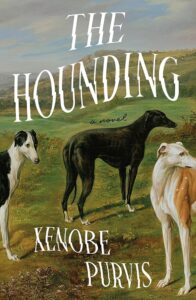
Xenobe Purvis, The Hounding
Henry Holt, August 5
You had me at “The Crucible meets The Virgin Suicides.” Add, perhaps, “meets Nightbitch,” considering the main complaint that the residents of Little Nettlebed have about the Mansfield sisters is that they are maybe, probably, definitely turning into dogs. I’m game. –ET, as recommended in our first-half of 2025 list
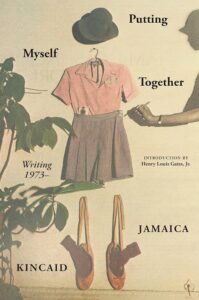
Jamaica Kincaid, Putting Myself Together: Writing 1973—
FSG, August 5
Jamaica Kincaid has been good company this year. I reread Annie John and marveled at how much raw truth she was able to pack into that slim little book. In this compendium collection, which includes pieces Kincaid published in The New Yorker and The Village Voice over her long career, completist fans fond of insight can enjoy some of her more penetrating essays. –BA, as recommended in our first-half of 2025 list
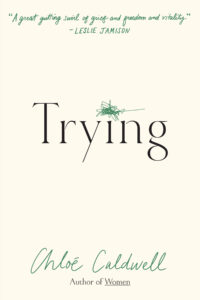
Chloé Caldwell, Trying: A Memoir
Graywolf, August 5
Chloé Caldwell’s cult classic novel Women was one of the best books I read last year, so I’m really looking forward to her new memoir. Trying is a memoir about family, marriage, queerness, and starting over. It’s about trying to have a child, but it’s also about trying to find fulfillment and live a life. This book is sure to be filled with Caldwell’s distinct sense of humor and her precise, honest observations about the world. –MC, as recommended in our first-half of 2025 list
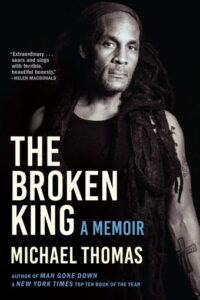
Michael Thomas, The Broken King: A Memoir
Grove, August 5
Almost 20 years later, the author of the International Dublin Literary Award-winning debut novel Man Gone Down has returned, this time with a memoir, his first work of nonfiction. In The Broken King, Thomas writes about his literary ambitions and success, and also about his absent father, his estranged brother, his two sons. He writes about being a Black man in America, about being a parent, about love and sadness. “There’s a bridge of beautiful American prose—lyrical, powerful, fearlessly candid—running straight from James Baldwin to Thomas, who is obviously Baldwin’s worthy heir,” writes Francisco Goldman. Like him, he adds, “Thomas writes about the struggle to be a man, and, simply and most complexly, on how to live.” –ET
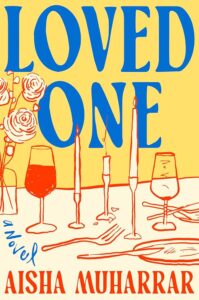
Aisha Muharrar, Loved One
Viking, August 12
Even if you don’t know Aisha Muharrar’s name, you probably know her work. A crown jewel in the comedy world cabinet, she’s written for belly-laugh factories like Hacks, The Good Place, and Parks & Rec. Her debut novel, Loved One, feels of a tonal piece with all those shows—sly, irreverent, and emotionally sophisticated. Following two women who forge an odd connection after the death of their mutual ex, the book has been described as a where-did-I-go-wrong style excavation. If you also love that structure—and nuanced depictions of heartbreak—let’s put a book club on the books. –BA
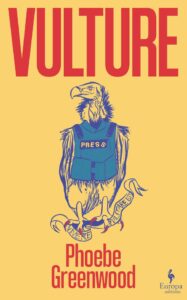
Phoebe Greenwood, Vulture
Europa Editions, August 12
Promo copy is describing this one as a modern Catch-22 “on speed.” And the way I leaned in!? Our absurd and violent times feel highly ripe for skewering, and the American war and news industries seem to be doing just about as good a job as they did in the 70s. In other words, I’m so ready for this debut, from former conflict zone journalist Phoebe Greenwood. Set on a beach in Gaza in 2012, this dark and tragic satire examines the media’s complicity in :gestures at world: –BA
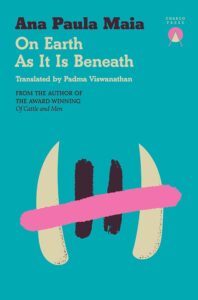
Ana Paula Maia, tr. Padma Viswanathan, On Earth As It Is Beneath
Charco Press, August 12
Maia’s first book translated into English, Of Cattle and Men, won the UK’s Republic of Consciousness Prize and the Cercador Prize and I’ve been looking forward to another translation ever since. This one, about a penal colony’s final days and the “most dangerous game” style attitude of the warden, looks similarly brutal and unforgettable. If you aren’t already a prison abolitionist, you will be after reading this. –DB
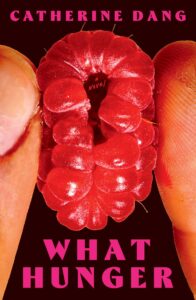
Catherine Dang, What Hunger
Simon & Schuster, August 12
A novel about food and identity and teenage girlhood, what a treat! What Hunger is about Ronny, a teenage girl whose primary tie to her Vietnamese heritage is through food. Her parents don’t like to talk about their past or the war, but they cook beautifully elaborate meals and teach their children that meat is a symbol of survival. When tragedy strikes, Ronny is suddenly overwhelmed by a craving for raw meat. But where will this craving lead? –MC
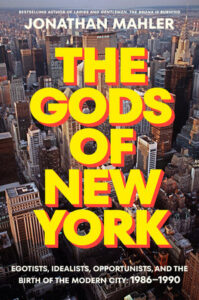
Jonathan Mahler, The Gods of New York
Random House, August 12
Had me at “expansive look at New York in the 80s.” This meaty history spans the AIDS crisis, the Central Park Five tragedies, and the Wall Street crash of 1987. Mahler, a staff writer at the New York Times Magazine, takes on the end of a decadent era with an eye to analyzing the conditions that laid the groundwork for 45’s rise. This one looks gritty and juicy and very ambitious. High on my TBR stack. –BA
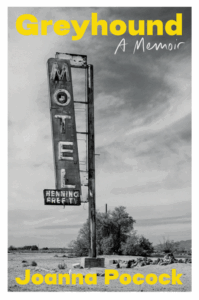
Joanna Pocock, Greyhound: A Memoir
Soft Skull, August 12
It’s hard to beat the propulsive elegance of a road trip narrative, whatever your literary project might be—and for Joanna Pocock that project is the combining of personal reflection, literary criticism, and ecological reckoning (as viewed from the window of a bus). Almost 20 years after journeying from Detroit to LA on a Greyhound, in the aftermath of a miscarriage, Pocock recreates her trip and is joined (in spirit) by fellow writerly road trippers like Simone de Beauvoir, Ethel Mannin, and Irma Kurtz. With clear eyes Pocock observes and reports from America’s interstitial spaces, its abandoned detours and dark medians, revealing a country of wild and violent edges that somehow still suffers beauty in its midst. –JD
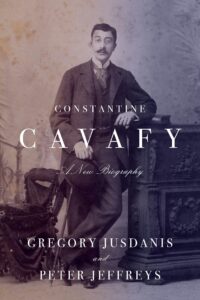
Gregory Jusdanis and Peter Jeffreys, Constantine Cavafy: A New Biography
FSG, August 12
EM Forster once described his friend, the poet CP Cavafy, as “a Greek gentleman in a straw hat, standing absolutely motionless at a slight angle to the universe.” When Cavafy died in 1933, at the age of 70, he left behind 154 poems and limited literary renown; only with the posthumous publication, in 1935, of his complete works in Greek, did that begin to change. Cavafy, who grew up in Alexandria, would come to be credited as the father of modern Greek poetry and, in translation, as a vital and important modernist poet. This new biography sheds light on Cavafy’s troubled, brilliant, migratory life, and confirms the timeless beauty of much of his work. –JD
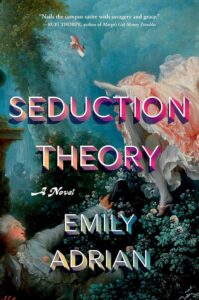
Emily Adrian, Seduction Theory
Little, Brown, August 12
At last, a book that is actually just as fun as it sounds. This a novel in the form of an MFA thesis, written to expose a revolving door of love affairs of the professors who are reading it, not to mention the graduate student who wrote it. I know. I know! A little bit postmodern, a little bit sexy, and quite funny indeed, you will feel both smarter and more indulgent than usual while you’re reading it (especially if you’ve ever been in any kind of writing program, or had any kind of insane crush), and really, isn’t that the best way to feel, in the summer or otherwise? –ET, as recommended in our summer reading list
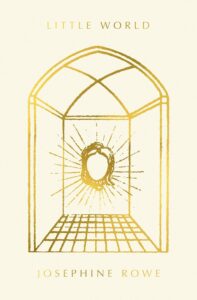
Josephine Rowe, Little World
Transit Books, August 12
Josephine Rowe is a remarkable writer, able to capture entire lives in a few paragraphs, creating characters so immediately recognizable, so deeply knowable, that you feel like they’re surely going on with their daily rituals, their heartbreaks and revelations, even after you’ve closed the book. Little World is perhaps her most structurally ambitious work to date, as it follows the unlikely remains of a South American child saint across thousands of miles and many generations, introducing us to all the beautiful, imperfect lives that cross her path, in what is billed as “a haunting reflection on violence and the interdependency of all things.” A must-read. –JD, as recommended in our first-half of 2025 list
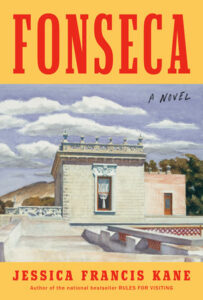
Jessica Francis Kane, Fonseca
Penguin Press, August 12
Kane’s latest novel is about a real episode in the life of the writer Penelope Fitzgerald, who left her husband and youngest child at home and traveled, pregnant, with her six-year-old in tow, to northern Mexico to try to secure an inheritance. But as with all things concerning silver mines, it’s not that simple. As a fan of both Kane and Fitzgerald, I’m looking forward to this one. –ET, as recommended in our first-half of 2025 list
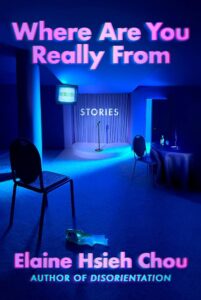
Elaine Hsieh Chou, Where Are You Really From: Stories
Penguin Press, August 19
In Chou’s debut novel Disorientation (you can read an excerpt here), PhD student Ingrid Yang is desperate to finish her dissertation on the late canonical poet Xiao-Wen Chou, fueled by bad food and worse drugs. It’s a satire of academia, race, and art. Her new short story collection (which includes a novella!) confronts many of the same themes via grotesques—mail order brides, au pairs, ugly ducklings, sex bots, dolls. It’s a collection that highlights the slipperiness of truth in storytelling with a touch of surrealism. –Emily Firetog, Deputy Editor
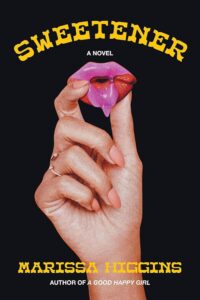
Marissa Higgins, Sweetener
Catapult, August 19
There’s a very near future where I’m probably bookclubbing this one with my partner and our friends. I feel very seen by stories about messy lesbians, to the point where I think most stories would be better if they were about messy lesbians. Even better when they balance the absurdity of being alive with the nuances of partnership and queer parenthood. –OS
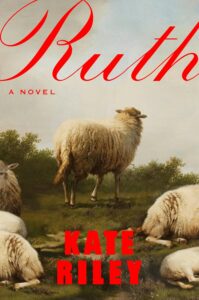
Kate Riley, Ruth
Riverhead, August 19
Ruth describes her life in an isolated community of “Christian communism”—there is no property, no television, and no tolerance for questions; the Brotherhood of elders makes all the decisions. Her life is recounted in glimpses of her childhood, marriage, and motherhood. Ruth tries to understand her own life. Is she happy? Very much looking forward to this debut. –EF

Natalie Bakopoulos, Archipelago
Tin House, August 19
An unnamed narrator on her way to a translation residency on the Dalmatian Coast has an unsettling run-in with a man on the ferry. While at the residency, the narrator rekindles a relationship with a man from her past, and impulsively sets out on a roadtrip back to Greece. A haunting novel with echoes of The Odyssey, Archipelago strikes a beautiful balance between meditation and mystery. –JG
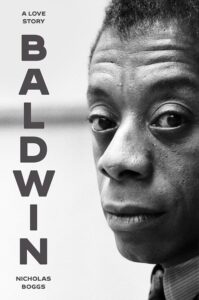
Nicholas Boggs, Baldwin: A Love Story
FSG, August 19
This is the first major biography of James Baldwin in thirty years, and at 720 pages, it is major—but Baldwin’s life and legacy merits the space. Baldwin scholar Boggs delves into the archives and adds original research and interviews to paint a picture of the great novelist, essayist, and political thinker’s complex artistic and emotional landscape, with special focus on the personal relationships through which his work was refracted. The result is a book, Imani Perry writes, that “brings us the beautiful yet tattered heart of not only Baldwin the intellectual and artist, but Baldwin the vulnerable, yearning, flesh-and-blood person.” I’ll be spending some time with this one. –ET
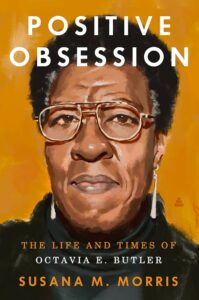
Susana M. Morris, Positive Obsession: The Life and Times of Octavia Butler
Amistad, August 19
I spent a summer in LA years ago, and one of the highlights was getting to see selections at the LAPL and Huntington Library from Octavia Butler’s archives. It’s clear from even her earliest writing, in diaries, notes, and the colorful inspiration she wrote to herself, that Butler was deeply engaged with her contemporary world, and that her speculative imagination was rooted in the conditions she observed on the western shore of a teetering empire. Butler’s science fiction bored deeper into the cruelties and contradictions of America, and were always clear-eyed about our evils, our violent habits, and the small embers of hope in our ingenuity and resilience. Morris’s new biography tells Butler’s story within America’s story, and examines how the social, political, and historical forces shaped her life and her work. I’m very excited for this one. –JF
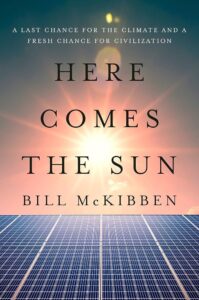
Bill McKibben, Here Comes the Sun
Norton, August 19
Bill McKibben needs no introduction as the environmentalist voice of our lifetimes: he’s a grounded, solid, thoughtful man who takes our world seriously, as seriously as we all should be taking it. He manages to project both hope and devastation, both warning and optimism. The book mainly orients around the sun and its grand capacity to give the world the energy it needs, if only the fossil fuel industry would let it. Here Comes the Sun promises to interrogate and analyze the ways our world can move forward in creative and logical ways. –JH
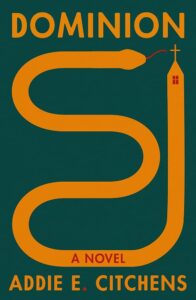
Addie Citchens, Dominion
FSG, August 19
I’ve been waiting for this novel ever since stumbling upon this perfect New Yorker story last winter. And Dominion did not disappoint. This stellar, utterly assured debut about the larger-than-life father and son about whom all congregants of the Seven Seals M.B. Church orbit simply crackles on the sentence level. We’re held in the minds of Priscilla, “First Lady” to the Reverend Sabre Winfrey, and Diamond Bailey, adoring girlfriend of the preacher’s golden son. These left of center women are charming, witty, sometimes heartbreaking chroniclers of the men who govern their lives. But the novel is as much a drama as it is a character study. Citchens is interested in the cult of patriarchy, and the many sins thoughtless worship enables.
Kiese Laymon has praised Citchens for capturing a “breathing” Mississippi with gumption. I’m another happy convert on the strength of this bright new voice. –BA, as recommended in our summer reading list
Tom Comitta, Patchwork
Coffee House Press, August 19
Tom Comitta, author of the, well, patchworky opus The Nature Book, is back with a new endeavor: a story about stories, made up of stories. And if this sounds simple and self-explanatory… read what I just said again. Committa has written a book that combines every writer and every book, but by isolating and exploring the elements that stories fundamentally share with one another. –OR, as recommended in our first-half of 2025 list
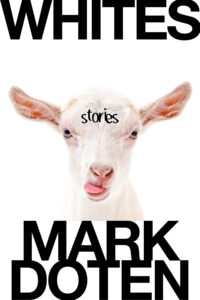
Mark Doten, Whites: Stories
Graywolf, August 19
The first story collection from one of our great contemporary satirical novelists—I’m almost afraid to see what they’re going to do with the short form, but I’m sure it will be lacerating—all the hyper-contemporary tales here are narrated by various white people who “are united by a ferocious belief in themselves, certain that everything they’ve done can be justified, if you’ll just hear them out”—and brilliant. –ET, as recommended in our first-half of 2025 list
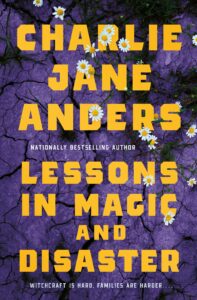
Charlie Jane Anders, Lessons in Magic and Disaster
Tor Books, August 19
All the Birds in the Sky is one of the towering instant-classics of 21st Century SFF and I’m so excited for Anders to return to adult fiction (after a terrific YA space opera trilogy). This one, about a witch who teaches her mother magic (and uncovers some dark secrets in the process), should be a total delight for the late summer, one-more-book-before-back-to-school days. –DB, as recommended in our first-half of 2025 list
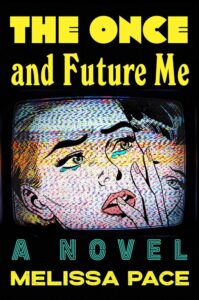
Melissa Pace, The Once and Future Me
Henry Holt, August 19
This book will blow your mind!!!! It kind of felt like a Marvel movie, but like, one that’s actually good! Pace’s amnesiac heroine, locked up in a mental institution and subjected to strange experimental procedures, must escape her padded prison and find out what exactly she’s forgotten, and what role her husband has played in all this, well, madness. I cannot tell you more without spoilers, but even as someone who reads 150+ books a year, I was genuinely surprised. –MO, as recommended in our first-half of 2025 list
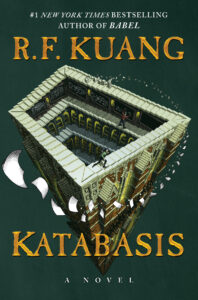
R.F. Kuang, Katabasis
HarperCollins, August 26
I was at a bar recently talking with a friend about how excited we both were for this book. Granted I am usually talking about books, but still! R.F. Kuang is one of the best fantasy authors working right now and I’m truly so stoked about this book. Katabasis is about a graduate student at the Cambridge school of Magick who has to team up with her rival to journey into Hell and save the soul of her favorite professor. I don’t know what more I can say. If that description doesn’t immediately launch this book to the top of your TBR, we could never be friends. –MC
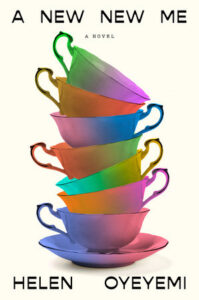
Helen Oyeyemi, A New New Me
Riverhead, August 26
Helen Oyeyemi occupies a similar space as Wes Anderson in my creative consciousness: they’re making their own shit, and whether or not any given instance works, I’m committed to experiencing each and every iteration. Oyeyemi’s latest folktale-gone-weird is about a woman with a different personality that manifests every day of the week, and what happens when one of those personalities goes rogue and kidnaps a man. It’s bringing to mind Shirley Jackson’s The Bird’s Nest, except weirder. –DB
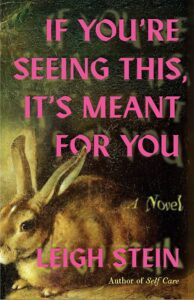
Leigh Stein, If You’re Seeing This, It’s Meant for You
Ballantine, August 26
Leigh Stein cemented herself as a satirist of Our Present Moment with the very funny Self Care (and attendant social media posts, which still make me laugh); in her latest, a Gothic novel about social media, a woman hired—after being dumped on Reddit—to promote a hype house that is also the scene of a mysterious disappearance. Turns out nothing is scarier than the influence machine. –ET
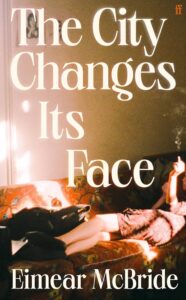
Eimear McBride, The City Changes Its Face
Faber US, August 26
For those bored of traditional grammar and seeking sonic sensation, prizewinning experimental novelist Eimear McBride can always be counted on for a good time. (The Irish novelist’s fourth novel, which revisits characters from 2016’s The Lesser Bohemians, comes to us as one of the first offerings from legendary UK indie publisher Faber & Faber’s new US division.) Lovers in London, but make it daringly modernist and inventive and odd. –ET
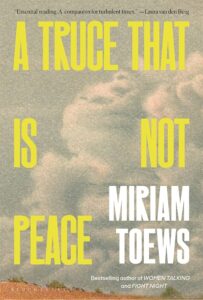
Miriam Toews, A Truce That is Not Peace
Bloomsbury, August 26
Miriam Toews is one of those IYKYK writers. If you’ve read the dazzling and heartbreaking All My Puny Sorrows, there’s a 90% chance you’ve already signed your name in blood to the Toews hive for life. (This is just statistical math.) Her latest is a rangy memoir, framed as a response to the question, “Why do you write?” And if this excerpt is to be believed, we can expect to find an answer in the affect. Opening pages show Toews’ characteristic wit and guile squaring off against extraordinary pain. (CW: suicide, depression, death.) –BA
September
Kevin Young, Night Watch: Poems
Knopf, September 2
A new Kevin Young collection is always good news for lovers of poetry (and anyone hoping to indoctrinate the poetry skeptical—seriously, Young’s poems are the perfect indoctrination tool). Night Watch—written over the course of sixteen years—explores identity and Black history. It promises to be a marvel of language, music, and impeccably rendered truths. –JG

Rabih Alameddine, The True True Story of Raja the Gullible (and His Mother)
Grove, September 2
I love Alameddine’s sardonic, clever novels, and especially his indelible characters, so I’m looking forward to his latest, in which a gay man living with his mother in Beirut is offered a dream residency in America—which causes him to revisit some of his most nightmarish days. Promises to be full of dry banter in the face of historical upheaval and emotional calamity, which is my favorite Alameddine mode. –ET
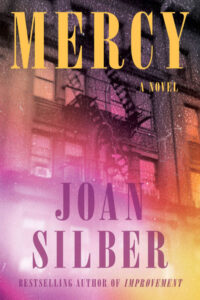
Joan Silber, Mercy
Counterpoint, September 2
Sometimes, life can come down to one decision. One act, one choice, that will define everything that comes after. Ivan, the protagonist of Mercy, knows this well. One night in the 70s, he and his best friend Eddie take heroin and Eddie has a bad reaction: Ivan thinks Eddie is dying, takes him to the ER, and leaves. This act, the abandonment of his best friend in his greatest time of need, is the greatest shame and weight that will haunt Ivan for the rest of his life. It’s what he carries, always, and it is what changes both their lives in enormous, untold ways. A story of love, tragedy, of paths diverging and intertwining, Mercy is human and moving, awful and beautiful. –JH
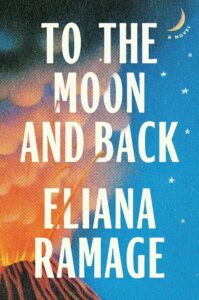
Eliana Ramage, To the Moon and Back
Avid Reader Press, September 2
Any story about somebody who wants to be an astronaut is bound to get my attention, but Ramage’s debut is a special one. It’s epic in scope, jumping across several decades and hopping the globe, but it never loses sight of the family story at its core and the Indigenous identities of its heroine Steph and her nearest and dearest. It’s a family novel, it’s an ambition novel, it is a novel that (you guessed it) shoots for the moon and makes it back safely to boot. –DB
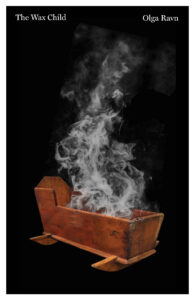
Olga Ravn, tr. Martin Aitken, The Wax Child
New Directions, September 2
Ravn’s The Employees is one of the absolute gems of a bright century for weird fiction so far and My Work was a spectacular and surprising turn, a vital exploration of modern motherhood—so I cannot wait to see what she does with a historical look at witches and witchcraft in Denmark in the 1600s. Also it’s apparently narrated by an actual wax doll, created by one of the accused witches? Sign me up, obviously. –DB
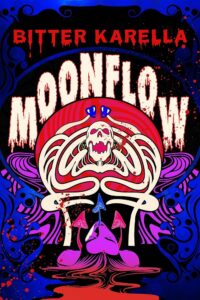
Bitter Karella, Moonflow
Run For It, September 2
Mushroom horror continues to be so very hot right now (hot enough to……grow mushrooms?!) and Karella’s debut novel is one of the best of the bunch. Set in a mysterious forest in Northern California (and expanding on the world of Karella’s delightful fiction-game Toadstools), Moonflow has weird mushrooms and feminist cults and folkloric monsters and real-life monsters and more. At times, it reads like a crime thriller and at other times it reads like a nature guide and at still other times it reads like Lynchian horror—but no matter the mode, it is a delight from start to finish. –DB
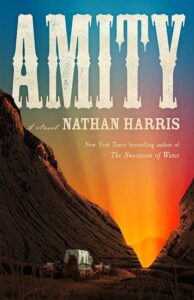
Nathan Harris, Amity
Little, Brown, September 2
Nathan Harris’ follow-up to his blockbuster debut The Sweetness of Water is another gripping historical novel. Amity follows a brother and sister in postbellum New Orleans, emancipated but still under threat from their former enslaver, as they travel across Mexico intent on freedom. Jason Mott says of novel: “The writing is flawless, the characters unforgettable and, most importantly, the story the world Harris builds never lets us go.” –JG
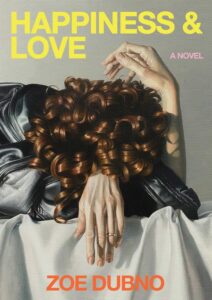
Zoe Dubno, Happiness and Love
Scribner, September 2
As a lover and supporter of bitches and haters, I am so ready for Happiness and Love. This novel about a woman who finds herself at a dinner party with her former art world friends seems extremely messy in a way that I love. Sitting in a room full of pretentious ex-friends and mentally eviscerating them all is a universal human experience. Dubno’s novel sounds equally thoughtful and nasty, clever and juicy and full of great drama. –MC
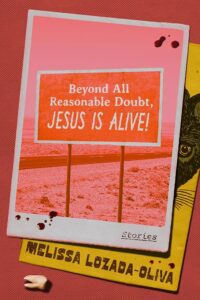
Melissa Lozada-Oliva, Beyond All Reasonable Doubt, Jesus Is Alive!: Stories
Astra House, September 2
Melissa Lozada-Oliva is a wonderful, wonderful writer. Her debut Candelaria was mesmerizing and magical, full of charming (or maybe “hexing”?) characters that seem caught between realities. There promises to be plenty more invention, viscera, and humor in these new stories, which feature decapitated quinceañera guests, a sentient tail, and a haunted punk house in Boston. What is most striking to me about Lozada-Oliva’s work is its tenderness in spite of the strangeness: she always loves the ghosts. No matter how surreal her writing gets, she never loses the thread of compassion. –JF
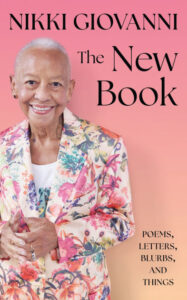
Nikki Giovanni, The New Book: Poems, Letters, Blurbs, and Things
William Morrow, September 2
The final collection from one of our most beloved and celebrated contemporary poets, who died in December 2024, includes not only poems but, as the subtitle informs, other short fragments, prose works, and ephemera. It’s always hard to know how essential posthumous collections will actually be, but I’m always willing to take a chance on Giovanni. –ET
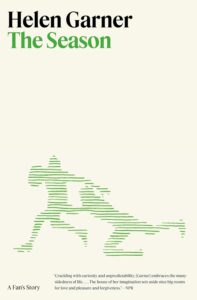
Helen Garner, The Season: A Fan’s Story
Pantheon, September 2
Add it to the collection of grandmother lit: Helen Garner, one of our most revered and lyrical writers, has written a spare, poignant, surprising story of soccer (or, football, or, “footy”) and grandsons. Garner and her grandson Amby become mutually obsessed with Australian footy as Amby’s team advances through the ranks of their league. Garner is a doting grandmother, but she is first and foremost a fan: she watches the team through her journalistic gaze, documenting the camaraderie, the bonds, the dramas, the high highs and low lows of team building in the face of extreme competition. A story of boyhood, of family, of sport, Garner is the voice to guide us through the world of footy and beyond, building us into as big of fans as she is. –JH
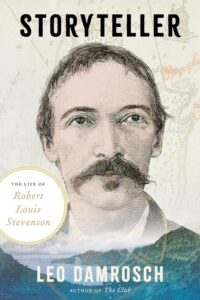
Leo Damrosch, Storyteller: The Life of Robert Louis Stevenson
Yale University Press, September 2
Oh what a life Robert Louis Stevenson packed into his tragically short 44 years: despite suffering from chronic bronchitis (not a great thing to have in the middle of the 19th century), Stevenson managed to travel the world, spending ample time in France, California, Hawaii, New Zealand, Australia and, finally, Samoa (where he earned the nickname that’s the title of this biography). All the while, Stevenson was able to write thirteen novels, seven story collections, eighteen works of nonfiction, and six poetry collections. A life as rich in letters as it was adventure, Stevenson’s is certainly worthy of Damrosch’s talents as a biographer. –JD
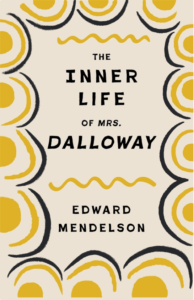
Edward Mendelson, The Inner Life of Mrs. Dalloway
Columbia University Press, September 2
It has been said that the entire world, future and past, can be found in the pages of Virginia Woolf’s modernist classic, Mrs Dalloway—as such, it is a book that demands rereadings and reinterpretations, and new critical frameworks for each generation of close readers. In his latest, billed as part criticism part love letter, Mendelsohn unravels Woolf’s densely packed themes—love, empire, mental health—in this essential companion to one of the 20th century’s most important novels. –JD
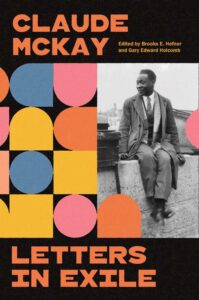
Claude McKay, ed. Brooks E. Hefner and Gary Edward Holcomb, Letters in Exile
Yale University Press, September 2
The Jamaican-born queer writer and poet Claude McKay was a hugely important figure in the Harlem Renaissance and in the American Modernist movement. An acclaimed novelist whose 1919 poem “If We Must Die” remains one of the most iconic pieces of protest verse ever written, McKay was also “a restless world traveler who sought spiritual, artistic, and political sustenance in France, Spain, Moscow, and Morocco.” This hefty compendium brings together two decades of dispatches from the road with correspondents like W. E. B. Du Bois, Langston Hughes, Alain Locke, Max Eastman, and Louise Bryant. –DS
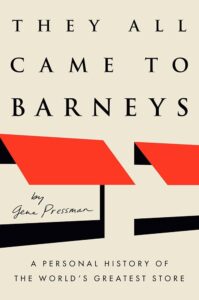
Gene Pressman, They All Came to Barneys: A Personal History of the World’s Greatest Store
Viking, September 2
One of my more niche interests is the history of retail. Is it because I used to work at a mall? Maybe! The continued decline of brick and mortar shopping, even in the luxury space, feels like something beyond an inevitable result of late stage technocapitalism, even if I can’t articulate why. It’s not exactly nostalgia, but adjacent. And I love a retro New York story. I’ll probably read this with a vaporwave mix playing in the background. –OS
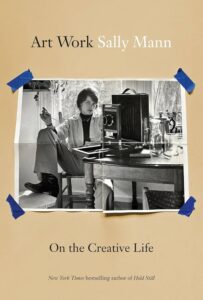
Sally Mann, Art Work: On the Creative Life
Abrams, September 2
Photographer Sally Mann’s 2015 Hold Still ranks among my favorite artist memoirs, in part because of Mann’s no-nonsense, irreverent style, but also because of her keen revelations about the nature of art-making. This new volume promises to give us more of the same, complete with photographs, letters, journal entries, and other ephemera, pasted right in. “This is a book about how to get shit done,” Art Work begins. Thank goodness she did. –ET
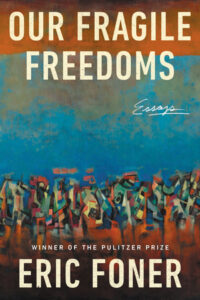
Eric Foner, Our Fragile Freedoms: Essays
Norton, September 2
Pulitzer Prize winner Eric Foner is the historian of the Civil War and Reconstruction eras, some of the most consequential years in American history. His work is academically rigorous, but always legibly rooted in the personal experience of people, tracing the impacts as well as the sources and intents of systems. In everything, Foner is vigilant to the individual and collective stakes of American history and politics. Our Fragile Freedoms collects his more recent writing, reviews, and essays on issues across the historical spectrum from America’s founding to our current precarity. This isn’t just “did you know” anecdotes, and anyone trying to understand our American moment should be turning to Foner. –JF
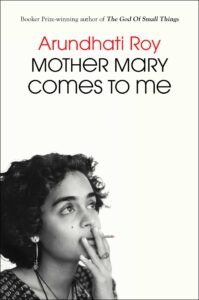
Arundhati Roy, Mother Mary Comes to Me
Scribner, September 2
The first memoir from the Booker Prize-winning author of The God of Small Things (and fearless, firebrand activist) will focus on Roy’s complex relationship with her late mother, who died in 2022. “I have been writing this book all my life,” Roy said of the upcoming memoir. “Perhaps a mother like mine deserved a writer like me as a daughter. Equally, perhaps a writer like me deserved a mother like her. Even more than a daughter mourning the passing of her mother, I mourn her as a writer who has lost her most enthralling subject.” –DS, as recommended in our first-half of 2025 list
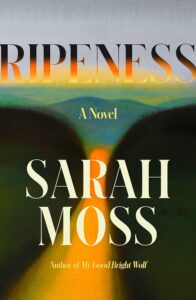
Sarah Moss, Ripeness
FSG, September 9
There is no novelist working in the English language today better than Sarah Moss at the creation of mood. Deep, immersive, subtle, all-encompassing mood. And the key, of course, is that as a reader, you can’t see it happening… So, what is the mood of her latest novel, split between 1960s Italy and present-day Ireland, a story of family and regret and consequences? Rueful, bittersweet, nostalgic. (Perfect.) –JD
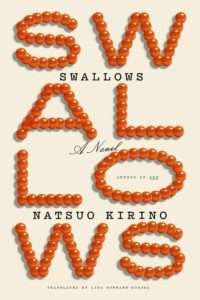
Natsuo Kirino, tr. Lisa Hofmann-Kuroda, Swallows
Knopf, September 9
I think all the time about Natsuo Kirino’s Out, which I first read in college and which I have been recommending to people (with strong stomachs and senses of humor) ever since. So it goes without saying that I am anticipating her newest book to be translated into English, in which a young woman signs up to donate her eggs and finds herself entangled in something much more complicated indeed. Considering Kirino’s skill in writing about women and bodies and the intricacies of class tension, my hopes are high. –ET
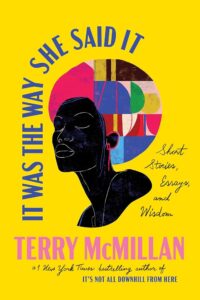
Terry McMillan, It Was the Way She Said It: Short Stories, Essays, and Wisdom
Ballantine, September 9
This motley prose collection from Terry McMillan, author of hit parades How Stella Got Her Groove Back and Waiting to Exhale, seeks to secure the popular writer’s place in the high canon of literary realism. In a glowing introduction, Ishmael Reed praises McMillan’s sentence craft, giving special props to her knack for rendering intimacy. As someone who first met and loved McMillan’s work through the Vaseline lens of this perfect Whitney Houston vehicle, I’m super excited to get better acquainted with the nuances of her short form voice. –BA
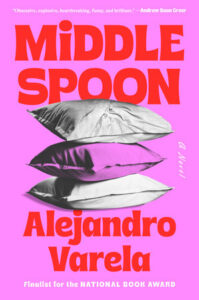
Alejandro Varela, Middle Spoon
Viking, September 9
I’ve been a fan of Alejandro Varela’s prose since inhaling his National Book Award long-listed debut, The Town of Babylon. Middle Spoon continues his stylish voyage across the rocky seas of young and young-ish modern love. Launching with the letters of a lovesick protagonist, this epistolary novel centers a recognizable Brooklyn Dad. Our unnamed narrator is queer, leftie, married-but-open, and nursing his first broken heart. Opening pages promise extremely delightful sentences, itchily close-to-home lifestyle critique, and a heart-forward analysis of the conundrum that is contemporary mating. –BA
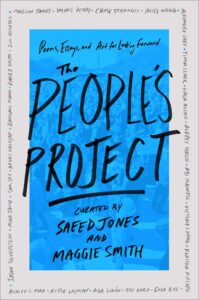
Maggie Smith & Saeed Jones, eds., The People’s Project
Washington Square Press, September 9
Curated by two sterling poets, collecting prose and poetry and visual art, The People’s Project is a “community in book form” meant to help us all make that better world. With contributions from the likes of Chase Strangio, Imani Perry, Eula Biss, Joy Harjo, Marlon James, Ada Limon, Danez Smith, Mira Jacob, and many more, it’s pretty much certain to inspire. –DB
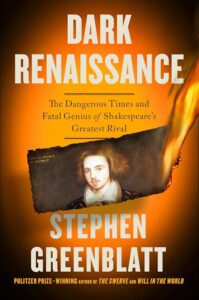
Stephen Greenblatt, Dark Renaissance: The Dangerous Times and Fatal Genius of Shakespeare’s Greatest Rival
Norton, September 9
You might know how Christopher Marlowe died (murdered in a pub brawl). But Greenblatt’s biography of the Renaissance poet and playwright does more than unpack the ‘other’ bard’s short life; he suggests that it was really Marlowe, rather than Shakespeare, who lit the flame under the literary Renaissance of Elizabethan England. Marlowe “made it possible to write in a new way about violence, ambition, greed, and desire. He offered poetic liberation.” –EF
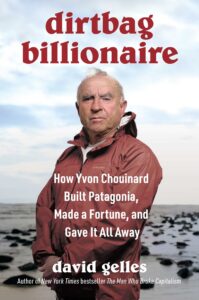
David Gelles, Dirtbag Billionaire: How Yvon Chouinard Built Patagonia, Made a Fortune, and Gave it All Away
Simon & Schuster, September 9
Most of you reading this probably agree that the very idea of a “billionaire” is absurd and immoral: one person should not have that much money. However, if all the billionaires in the world (there are currently 3,028 of them) did what Patagonia founder Yvon Chouinard did—GIVE ALL THE MONEY AWAY—it might redeem all the labor-exploitation, wage theft, and tax fraud that went into the creation of such obscene riches. Sadly, as this book clearly illustrates, Chouinard, is a rare, one-a-kind corporate genius, a founder who actually lived up to his ethical commitments, and (literally?) put his money where his mouth is—you won’t see too many other billionaires do what he did. –JD
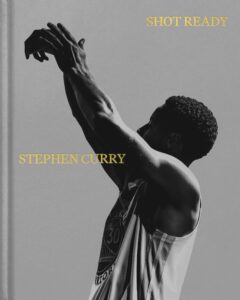
Stephen Curry, Shot Ready
One World, September 9
Get ready for a book of Curry’s advice, philosophy, reflections, with 100 glossy photographs to boot. Curry is charming, he’s funny, and he’s here to look back at a long and storied career alongside his fans. It’s a career that’s far from over, but one that has already cemented him as one of the greatest basketball players of all time. The sport is one of beauty, and Curry is one of the emblematic visions of the game. Shot Ready is perfect for all Warriors fans or anyone who loves the game as much as Curry does. –JH
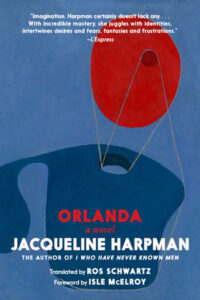
Jacqueline Harpman, tr. Ros Schwartz, Orlanda
Seven Stories, September 9
Transit Books’ reissue of I Who Have Never Known Men turned into an unexpected hit this year thanks to BookTok and I cannot wait to see what all those readers make of another Harpman reissue, this one riffing on Virginia Woolf’s Orlando and the possibility of ever-shifting gender expression, the pains of repression and oppression, and the joys of a bit of queer chaos. –DB
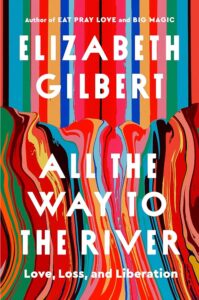
Elizabeth Gilbert, All the Way to the River: Love, Loss, and Liberation
Riverhead, September 9
A lot has happened to Elizabeth Gilbert since I last checked in with her: I’d wager many readers still think of her as the Eat, Pray, Love protagonist, who went in search of answers, found them and more, settled down with the man she met in the course of her searching, and lived happily ever after. Except, as with any story, so much happened after the end. For Gilbert, what happened was she became best friends with a woman named Rayya, who was diagnosed with terminal cancer a decade into their best friendship, at which point Gilbert realized that she had been in love with Rayya for years. She left her husband, became Rayya’s partner, and stayed to help ease the way for Rayya into her death. The End.
Except, even still, there was more. Rayya was an addict, and during the course of her dying, relapsed and became addicted to cocaine again. Prompting Gilbert to realize her own sex and love addiction. Two addicts, in love with each other, in love with their dependencies, on a downward spiral. Till death do they part. The book is intense. It’s moving, and shocking. Raw and real. More recovery memoir than anything else: but also a book of genuine care and soul-searching, speaking from the abyss of an experience we’d all be lucky to never have. It’s a tremendous achievement, a heart-breaking journey into the depths and back. –JH
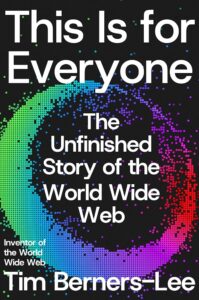
Tim Berners-Lee, This is For Everyone: The Unfinished Story of the World Wide Web
FSG, September 9
These have got to be pretty grim times for Sir Tim Berners-Lee, aka the guy who invented the internet and gave it away for free. Not because he didn’t become a billionaire but rather because his wonderful world wide web has devolved into an algorithmically dictated swamp of AI gobbledgook. Sir Tim, we’re sorry! Now that you’ve published your memoir, is there any chance you’ll come out of retirement and save the internet? Please? –JD
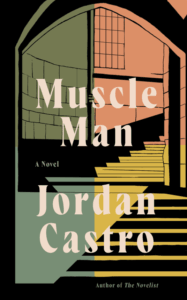
Jordan Castro, Muscle Man
Catapult, September 9
The false dichotomy between gym rat and bookworm has stood for far too long. Castro’s sophomore novel, which follows a day in the life of a weightlifting-obsessed English professor “as paranoia slowly transforms his mundane environment into something more foreboding” promises to finally to reveal the truth: that you can be a jock and a nerd at the same time and, if you work hard and persevere, you, too can override the positive mental health effects of working out through the sheer force of neuroticism. –CK, as recommended in our first-half of 2025 list
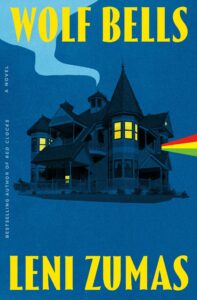
Leni Zumas, Wolf Bells
Algonquin, September 16
The thing about Red Clocks, Zumas’ previous novel, is that every cool writing professor I’ve ever known has a copy of it prominently displayed in their office. So I’m extremely looking forward to her new book, Wolf Bells. The novel is about a kind of retirement home where young people can live for free if they help out. The House is a fragile little commune run by a ex-punk singer, and its main mission is to be a place where everyone is welcome. But when two children show up at the house looking for help, The House and its mission are called into question. Wolf Bells is the newest entry in the socialist gothic canon. –MC
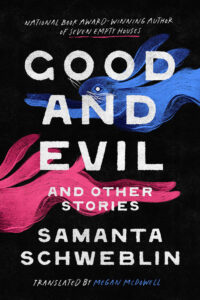
Samanta Schweblin, tr. Megan McDowell, Good and Evil and Other Stories
Knopf, September 16
In the eight years since Fever Dream helped kick off the wave of US readers finally getting to experience the best of Latin American weird fiction in translation, Samanta Schweblin and her reliable translator Megan McDowell have maintained a steady flow of unsettling and odd stories at every length. This new collection promises nothing less than the biggest dichotomy of all—good and evil—and is sure to deliver tense, beautiful, soul-shaking stuff. –DB
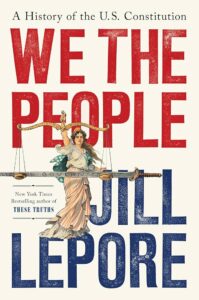
Jill Lepore, We the People: A History of the U.S. Constitution
Liveright, September 16
Isn’t it wild that the rights of the American people are so often determined by how a comparatively small group of individuals chooses to interpret the Constitution? We the People looks at the complexities of amending the Constitution and the disproportionate power the amendment process grants the Supreme Court. In the years following cases like Dobbs, and barely a week after United States v. Skrmetti, it all just feels so unfortunately relevant. –OS
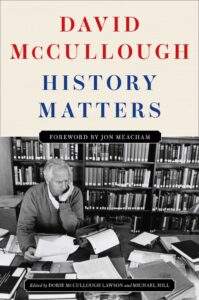
David McCullough, History Matters
Simon & Schuster, September 16
One need not agree with late historian David McCullough’s interpretations of the American past to respect his legacy as a writer and a researcher. And as we face a full-scale crisis in the humanities, fueled by book-bannings, authoritarian overreach, and widespread institutional cowardice, it is as important as ever to make the case for history in American schools that refuses to tailor its narratives to the rhinestone patriotism of the current White House. With this posthumous collection of essays, edited by his daughter Dorie McCullough Lawson, McCullough reminds us how important it is to try to understand where we came from, that we might know where we’re going. –JD
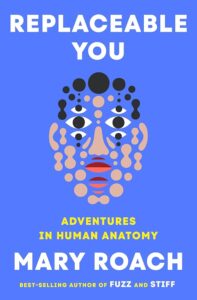
Mary Roach, Replaceable You: Adventures in Human Anatomy
Norton, September 16
I love the way Mary Roach approaches a book project. It’s a deep dive not just into a specific odd or gross subject—say, human cadavers (Stiff) or space (Packing for Mars)—but into the weird, wonderful stories of the people who work around those subjects as well. In an age where stem cells can grow organs and scientists are 3D printing body parts, it’s a natural progression for Roach to consider questions of the human body and its failings: “When and how does a person decide they’d be better off with a prosthetic than their existing limb? Can a donated heart be made to beat forever? Can an intestine provide a workable substitute for a vagina?” Speaking with researchers, surgeons, and amputees, Roach looks at what happens when the human body starts to fail, and who is there to fix it—and why. –EF
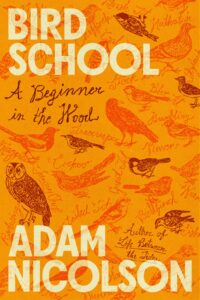
Adam Nicolson, Bird School: A Beginner in the Wood
FSG, September 16
It is not necessarily a foregone conclusion that when a man turns 37 he immediately wanders into the woods to look for birds—to “watch them” if you will. However, it is hard to ignore that evidence that birdwatching has become one of the most important pursuits of the post-covid elder millennial. If you are one of these men, or women, or person (or know one), this book is for you. Much, much more than just a field guide, though, Bird School is part philosophy part ecological diary, and reveals Adam Nicholson’s story of finding the natural world in an abandoned field near his home in Sussex, and the years spent investigating all the life therein. –JD

Eliezer Yudkowsky and Nate Soares, If Anyone Builds It, Everyone Dies: Why Superhuman AI Would Kill Us All
Little, Brown, September 16
In what might be the most compelling title of the year, Yudkosky and Soares, two early innovators in the field of artificial intelligence, send the clearest, direst warning yet. If we keep pursuing autonomous and superhuman AI it will eventually destroy us. Seems more important than your little ChatGPT parlor games, no? –JD
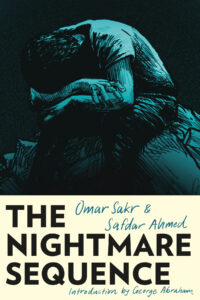
Omar Sakr and Safdar Ahmed, The Nightmare Sequence
Nightboat, September 16
A collaboration between poet Omar Sakr and visual artist Safdar Ahmed, The Nightmare Sequence is a searing response to the endless deluge of atrocities that have been committed in Gaza by Israeli forces since October 2023. A stark and painful interrogation of the act of witnessing, Sakr and Ahmed blend verse and image to consider, “the terrible and helpless distance of vision, the impact of being exposed to violence of this scale on a daily basis, and what it means to live in a society that is actively participating in the catastrophic destruction of Arabs and Muslims overseas.” –DS
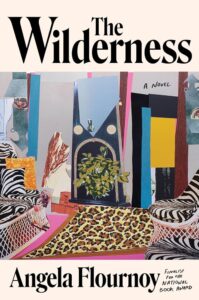
Angela Flournoy, The Wilderness
Mariner, September 16
I’m a huge admirer of Angela Flournoy’s writing and was thrilled to read that a new novel (the follow up to her 2015 debut, The Turner House, which was a deserved finalist for the National Book Award) was on the horizon. The Wilderness—one half of a reported two-book, seven-figure deal—follows four Black women over the course of two decades of friendship, examining “how gender expectations, race, class and the shifting dynamics of city life” make their mark on them. –DS, as recommended in our first-half of 2025 list
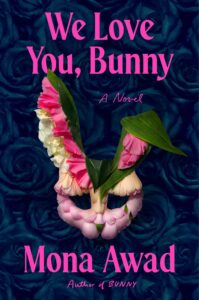
Mona Awad, We Love You, Bunny
Marysue Rucci Books, September 23
The Bunnies are back! In Awad’s Bunny, Samantha Heather Mackey falls in with a group of girls at their elite MFA program who use their weird, occult powers to turn bunnies into boys. In this sequel, Sam has published her first novel to critical acclaim, but the Bunnies aren’t happy with the way they’ve been portrayed. So they kidnap her. The Bunnies get to tell their side of the story: it’s an Alice in Wonderland, dark academia, slasher romp that is so much fun. –EF
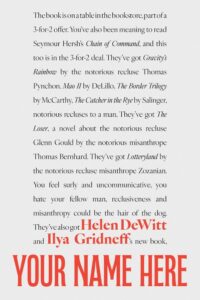
Helen DeWitt and Ilya Gridneff, Your Name Here
Dalkey Archive Press, September 23
Listen, I will read anything that Helen DeWitt writes (or co-writes, with journalist Gridneff), especially when it’s giving so much Calvino right off the bat, and especially when it’s been a project of decades—n+1 published what was then its first chapter in (checks watch) 2008. Its publisher calls it “a spectacular honeycomb of books-within-books, weaving together material as diverse as America’s “War on Terror,” countless years of literary history, Scientology, dream analysis, linguistics, email correspondence, screenshots, and graphs into a novel of unparalleled scope and vision.” Can’t wait to fight about all 600 pages with everyone. –ET
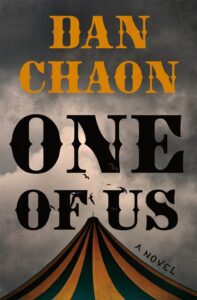
Dan Chaon, One of Us
Holt, September 23
Literary horror is a tricky genre, but few do it better than Dan Chaon. His latest novel is a “playfully macabre and utterly thrilling tale” set in 1915, about orphaned telepathic twins on the run from a murderous con man who claims to be their uncle. The twins find refuge with the “Emporium of Wonders” in a traveling carnival, and travel the country, with their uncle in pursuit. Serial killers and carnival misfits? I’m in. –JG
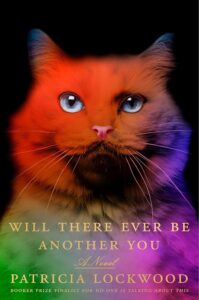
Patricia Lockwood, Will There Ever Be Another You
Riverhead, September 23
Lockwood wrote about her experiences with COVID-fugue state in her London Review of Books diaries (bookmark this piece for sure); now, in novel form, Will There Ever Be Another You follows a young woman trying to keep her family—and mind—together during a pandemic. I am thrilled to read a novel about the pandemic, especially from Lockwood, who has already so aptly written about what it’s like to live inside the internet, outside of time, and with a failing body. I’m happy to remember when it all went so wrong, and I hope our general, misplaced distain for literature that looks too closely at the recent past doesn’t stop readers from grabbing this one. Let Lockwood hold a mirror up to ourselves! –EF
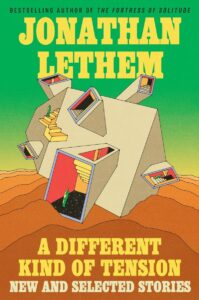
Jonathan Lethem, A Different Kind of Tension: New and Selected Stories
Ecco, September 23
Jonathan Lethem has always been my favorite of the literary Jonathans. The breadth of his output is the kind of thing more writers should aspire to: science-fiction, mystery, crime, literary fiction, humor, tragedy. Nothing less than the full breadth of human experience, you might say—and so I’m particularly excited for his having reached the level of literary fame that allows for a “new and selected” collection: an opportunity to meet Lethem in his fullest expression, whether for the first time or the fiftieth. –DB
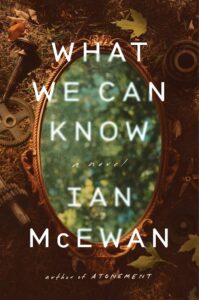
Ian McEwan, What We Can Know
Knopf, September 23
The latest novel from the Booker prize–winning, bestselling author of Atonement is a little bit Cloud Atlas, a little bit Possession. We begin in 2014, as a renowned poet reads a new poem at his wife’s birthday party. Then we find ourselves in 2119, the world barely left after a nuclear event and the rising seas, as one scholar searches for that very poem. What can I say, I’m a sucker for this kind of thing! –ET
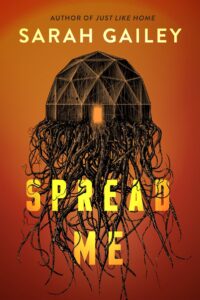
Sarah Gailey, Spread Me
Nightfire, September 23
Gailey is at their absolute best when writing horror (Just Like Home is one of the great haunted house novels of all time) and Spread Me goes full-bore. Not for the faint of heart or stomach, Gailey’s desert riff on John Carpenter’s The Thing manages to be both sexy and scary as hell. It will burrow its way into you and you’ll welcome it. –DB
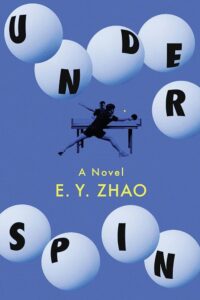
E.Y. Zhao, Underspin
Astra House, September 23
Challengers, but make it table tennis. Underspin tells the story of a table tennis star who was destined for greatness, but wound up dead before he was 25. The story is told not by the star himself, but by those around him, those trying to make or break a future champion. I love a character portrait and I love a bildungsroman and I love a sports story that isn’t really about sports (“A League of Their Own isn’t a sports movie, it’s about sisterhood and the war!”), so this book sounds perfect to me. –MC
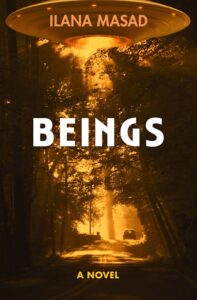
Ilana Masad, Beings
Bloomsbury, September 23
Writer and critic Ilana Masad is back with a riveting new novel about marriage, memory, and, best of all, extraterrestrial life. A couple goes on a drive through the New Hampshire forest, bathed in an unexplainable light. Years later, through hypnosis, their memories of this encounter reappear: what happened, what didn’t happen, who they are, who they were, all come into question. There are two other storylines throughout this work, that all navigate the ideas of fact and fiction, what to believe, and how to come to terms with who we are as people, or as aliens. Masad has created a stunning work that manages to both question everything, and answer all our dreams of what a genre-spanning, speculative novel can be. –JH
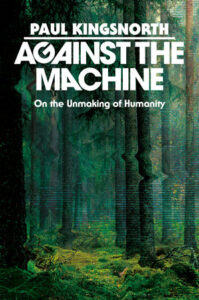
Paul Kingsnorth, Against the Machine
Thesis, September 23
Kingsnorth is one of the best writers, fiction or non-fiction, on the struggle between the natural world and the anthropocene. Against the Machine promises “a spiritual manual for dissidents in the technological age” and a wide-ranging examination of the roots of our “line must go up” profit-above-all society and how the spread of that rot affects our very humanity. I don’t know about you but I feel like I need it, and yesterday. –DB
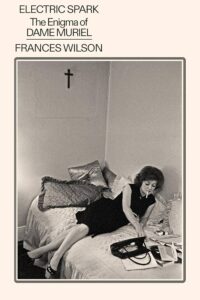
Frances Wilson, Electric Spark: The Enigma of Dame Muriel
FSG, September 23
Did you know that Muriel Spark started out as a literary biographer, writing epics on Mary Shelley and Emily Brontë? I’m excited to see one of our best modern novelists become the subject of her own tribute. Electric Spark: The Enigma of Dame Muriel is a close, fond look at the ultimate writer’s writer’s early life and process. Written by Frances Wilson, a master of the form, this account looks at the art Spark made of “beginnings and endings,” and traces how my favorite Dame found her voice. –BA
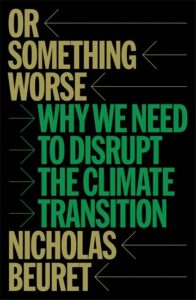
Nicholas Beuret, Or Something Worse: Why We Need to Disrupt the Climate Transition
Verso, September 23
I assume we’re all trying to channel our climate anxiety into something actionable, so I appreciate that environmental politics lecturer and advocate Nicholas Neuret’s book not only lays out the case against “green capitalism,” but also highlights the work of those fighting back against it. We need books that inspire action, and I welcome any work that contributes to mitigating unproductive despair and inspiring the fight ahead. –JG
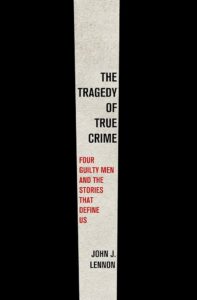
John J. Lennon, The Tragedy of True Crime: Four Guilty Men and the Stories That Define Us
Celadon, September 23
Incarcerated journalist John J. Lennon is one of our most incisive writers on crime, incarceration, and the human lives behind statistics. A two-time finalist for National Magazine Awards, Lennon has written widely about his life in prison, and his first book tells the stories, in full color, of four men who have killed, and in doing so, naturally “challenges our obsession with true crime.” –JG
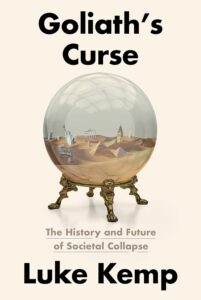
Luke Kemp, Goliath’s Curse: The History and Future of Societal Collapse
Knopf, September 23
Does any book feel more timely right now than one that surveys the ruins of fallen society? Cambridge scholar Luke Kemp explores societal collapse from the stone age onward, using it as a lens to better understand human history as a whole. If it sounds a little heavy, keep in mind that Johann Hari, author of Stolen Focus calls the book “deeply sobering and strangely inspiring.” Phew! –JG
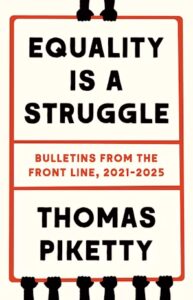
Thomas Piketty, Equality Is a Struggle: Bulletins from the Front Line, 2021-2025
Yale University Press, September 23
It can be hard to keep up with Piketty’s work if you don’t speak French. He consistently publishes in Libération and Le Monde, but I rarely come across that day-to-day writing in translation. This collection offers a unique chance to read his first drafts on the pressing issues of the day: the seemingly global political lurch rightward, the brutal violence in Ukraine and Gaza, and China’s ascendance. There is hope and a vision for the future here too, especially in an “extended introductory essay arguing that an ecological socialism remains the best hope for global equality.” –JF
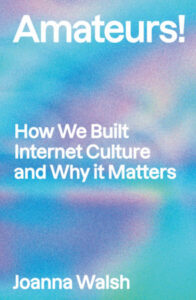
Joanna Walsh, Amateurs! How Users Built Internet Culture and Why It Matters
Verso, September 23
The version of the internet that my generation came of age with, defined by user generated creativity within enclosed private platforms, has quickly moved from an imaginative culture to a mandatory part of our lives. How did posting become such a source of power and wealth? Amateurs! makes the case that platforms inviting us to create art as a means of communications became traps. Arguing that internet amateurism is “an aesthetic revolution as big as modernism,” Walsh traces both how it allows for greater activism and solidarity, while also creating the conditions for exploitation: AI resource guzzling, alt-right brain rot, and the brutal inequities of neoliberal economic extraction. –JF
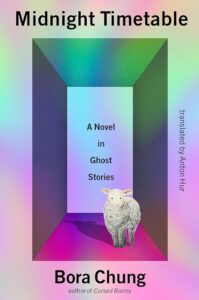
Bora Chung, tr. Anton Hur, Midnight Timetable: A Novel in Ghost Stories
Algonquin, September 30
I love a novel-in-stories!! The whole idea of it never fails to delight me and a novel in ghost stories might as well be written for me specifically. The latest from Bora Chung is about one night in a research facility for cursed objects—I’m anticipating horror, I’m anticipating weird humor, I’m anticipating the terror of the workplace, and sneaky insights on modern humanity to boot. For anybody who has ever pondered the Backrooms or visited the SCP Foundation, Midnight Timetable must be on your TBR. –DB
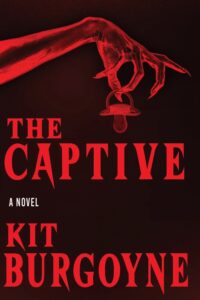
Kit Burgoyne, The Captive
Hell’s Hundred, September 30
Burgoyne is the pen-name of the Booker-longlisted Ned Beauman and here he goes full pulpy horror. A group of revolutionaries kidnap a young heiress only to discover that she’s very much pregnant—and that her shortly-thereafter delivered baby might be the Antichrist or something like it. What ensues is a madcap take on the classic devil-baby story, channeling both Rosemary’s Baby and Good Omens. Sounds like a total blast. –DB
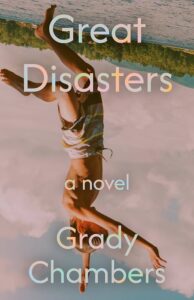
Grady Chambers, Great Disasters
Tin House, September 30
As a poet-turned-novelist, I’m admittedly biased, but I’m a sucker for a poet novel. Grady Chambers, author of the collection North American Stadiums, brings his skills to bear on a coming-of-age story about six young men as they move through childhood and the diverging paths of early adulthood. Dana Spiotta writes, “With great compassion and an evocative sense of place and history, Chambers captures the intricate ways adulthood is shaped by the long shadows of adolescence.” –JG
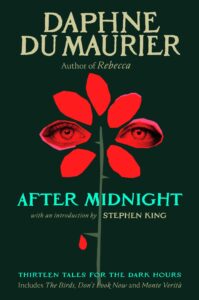
Daphne du Maurier, After Midnight: Thirteen Tales for the Dark Hours
Scribner, September 30
A delicious title. An iconic writer. A compendium of her finest gothic tales. After Midnight brings together some of du Maurier’s most celebrated shorter works of psychological terror, including “The Birds” and “Don’t Look Now,” alongside lesser-known stories like “The Blue Lenses” (in which a woman recovering from eye surgery finds she now perceives those around her as having animal heads corresponding to their true natures), and “The Breakthrough” (in which a scientist conducts experiments to harness the power of death. Oh, and it’s got an introduction by du Maurier superfan Stephen King. –DS
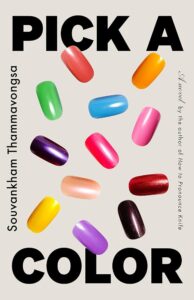
Souvankham Thammavongsa, Pick a Color
Little, Brown, September 30
Ning, a retired boxer, now owns a nail salon and as “Susan” she buffs and clips and polishes and tweezes. Thammavongsa’s excellent short story collection, How to Pronounce Knife likewise followed complex characters at the margins, power dynamics, class, and belonging. In her new novel, taking place during a single day at the salon, Thammavongsa sets her place as a “premier chronicler of the immigrant experience, in its myriad, complex, and slyly subversive forms.” –EF
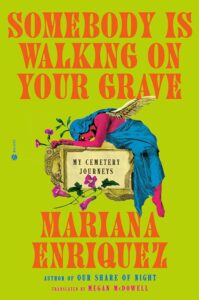
Mariana Enriquez, tr. Megan McDowell, Somebody Is Walking on Your Grave: My Cemetery Journeys
Hogarth, September 30
Just in time for spooky season, Mariana Enriquez is here with her first piece of translated non-fiction: a walk through graveyards and cemeteries around the world. I absolutely adore Enriquez (Our Share of Night was my favorite novel of 2023, terrifying and heartbreaking in equal measure) and I cannot think of a better guide through not exactly the realm of the beyond—but rather, the all-too-real spaces where we, the living, must confront the inevitability of ‘that undiscovered country from whose bourn no traveler returns.’ –DB
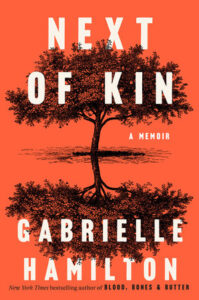
Gabrielle Hamilton, Next of Kin: A Memoir
Random House, September 30
Chef Gabrielle Hamilton, author of the bestselling 2011 memoir Blood, Bones & Butter, is back with a book about her idiosyncratic family. Michael Cunningham calls it “piercing, horrifying, and perversely gorgeous,” and writes that “it charts, with almost murderous precision, the myriad ways in which family and fate collide.” I will be putting aside my annoyance about Hamilton being a superstar in two fields (food, prose) and reading. –ET
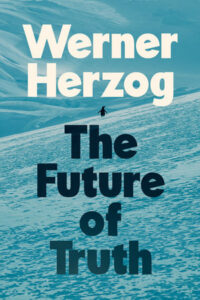
Werner Herzog, tr. Michael Hofmann, The Future of Truth
Penguin Press, September 30
Legendary German filmmaker Werner Herzog’s personal exploration of the nature of truth (and how to find it in a “post-truth” era) mixes memoir, history, politics, poetry, science, and “fierce opinion,” all in a compact 128 pages. I can think of few artists whose musings on truth I’d rather have wash over me. Assuming Werner also narrates the audiobook, I intend to absorb this one aurally while taking a brooding autumnal walk in the woods. –DS
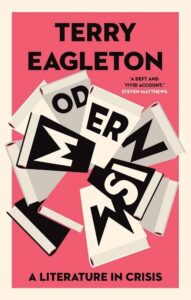
Terry Eagleton, Modernism: A Literature in Crisis
Yale University Press, September 30
If you’re a lapsed theory guy like me, you already know Terry Eagleton’s writing. As an academic and public intellectual, Eagleton has written dozens of witty, approachable, book-length essays on big ideas: literary theory, Marxism, humour (he’s English), and more. This latest book explores the innovative literary style of modernism through its works, ideas, and influence. His work is always rigorous and thought-provoking, but rarely stuffy. If you have an interest in art or ideas, Eagleton’s slim books are always appointment reading. –JF
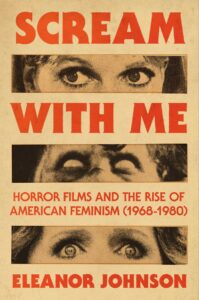
Eleanor Johnson, Scream with Me: Horror Films and the Rise of American Feminism (1968-1980)
Atria, September 30
I get really excited about interpretations of horror that examine gender and bodily autonomy, and with the reversal of Roe as a starting point, Scream with Me gives horror cinema from the New Hollywood era a feminist reading, considering what films like The Shining, Rosemary’s Baby, and The Exorcist expose about the politics of American womanhood. –OS

Plestia Alaqad, The Eyes of Gaza
Little, Brown, September 30
In early October 2023, 21-year-old Plestia Alaqad was a recent university graduate hoping to pursue a career in journalism. Within a month, her homeland was in flames and Alaqad was broadcasting videos of destruction to millions of people around the world. In the weeks following October 7, as Israel rained down bombs on Gaza, Alaqad fled from neighborhood to neighborhood, documenting in her diary the brutality of the Israeli assault as well as the bravery of Palestinians on the ground, all while trying to commit to memory the faces of those around her “so somebody will have known them before the end.” An on-the-ground record of the early days of this ongoing genocide, The Eyes of Gaza is also a tribute to Alaqad’s brutalized homeland and an ode to the resilience of her people. –DS
October
Katherine Dunn, Near Flesh: Stories
MCD, October 7
If you read Katherine Dunn’s 1989 cult classic novel Geek Love—about a travelling carnival run by two eccentrics who decide to breed their own freak show using various drugs using radioactive material to alter the genes of their children—and it didn’t change your life, well, I feel sorry for you. Dunn, who died in 2016, was a true original and this, her first and only collection of short stories—about motherhood, violence, and female desire—should be on the top of every Geek Love fan’s TBR pile. –DS
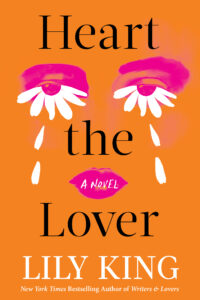
Lily King, Heart the Lover
Grove, October 7
Lily King is back, and quickly proving herself to be the master of the literary love triangle with her newest novel, in which an intricate college threesome reverberates unexpectedly into adulthood. Like everyone else, I adored Writers & Lovers, and cannot wait for this latest. –ET
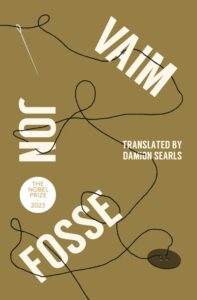
Jon Fosse, tr. Damion Searls, Vaim
Transit Books, October 7
The first book by Fosse, and translated by the celebrated Searls, since the former was awarded the Nobel Prize in Literature, Vaim begins a planned trilogy set in a “remote Norwegian fishing village.” In it, a simple encounter unspools into three different stories, each equally invested in the vagaries of the human condition. –ET
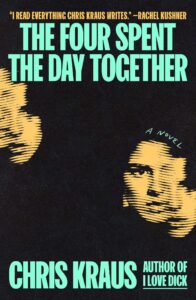
Chris Kraus, The Four Spent the Day Together
Scribner, October 7
Will I read anything Chris Kraus writes? Oh, probably. But I am especially looking forward to this novel, which explores the aftermath of a murder in the depressed Iron Range of Minnesota, as an LA transplant becomes increasingly invested in—obsessed with—the case. No doubt it will be smarter and weirder than everything else you’ve ever read. –ET
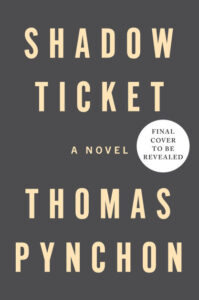
Thomas Pynchon, Shadow Ticket
Penguin Press, October 7
After a twelve-year hiatus, the most reclusive man in American fiction is back with a Milwaukee-set Depression-era novel about a one-time strikebreaker turned private eye whose seemingly straightforward assignment (track down and bring home the heiress of a Wisconsin cheese fortune) turns into something far more complicated when he’s spirited off to Hungary to tangle with “Nazis, Soviet agents, British counterspies, swing musicians, practitioners of the paranormal, and outlaw motorcyclists.” Sounds like a hoot. –DS
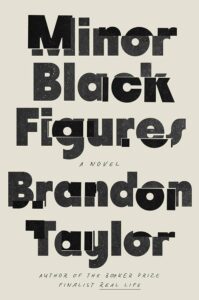
Brandon Taylor, Minor Black Figures
Riverhead, October 14
Brandon Taylor is without a doubt our laureate of hyper-intelligent yearning—nobody does it better. With his third novel, Minor Black Figures, Taylor brings his characters—in this case a contemporary artist and a very lapsed seminarian—into the throes of the cutthroat New York art world. And guess what? Hyper-intelligent yearning ensues. –JD
Fredrik DeBoer, The Mind Reels
Coffee House Press, October 7
In this debut novel from academic and critic DeBoer, a young woman goes mad in a dorm room—but not attractively, literarily mad; quite the opposite. Andrew Martin calls it “one of the most precise and harrowing depictions of mental illness I’ve ever read… a relentless, compassionate, and beautiful debut novel.” Good enough for me. –ET
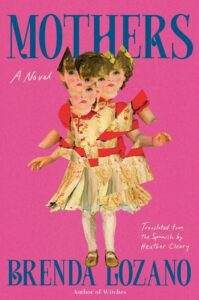
Brenda Lozano, tr. Heather Cleary, Mothers
Catapult, October 7
In 1940s Mexico, one little girl is kidnapped as another gets adopted. Though the verbs could change, depending on who you ask. I see bones of the Coen brothers’ Raising Arizona in this plot description. But Mothers, the latest novel from a reigning bard of women in crisis, Brenda Lozano, looks to be more thrilling than silly. The author who brought us Witches is interested in the class structures that drive mothers to desperate measures. Same here. –BA
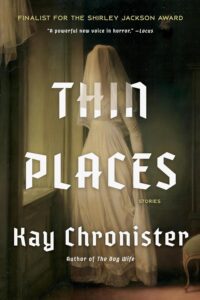
Kay Chronister, Thin Places: Stories
Counterpoint, October 7
Hard for me to not slip in a Crypt Keeper voice when recommending this booo-tifully written skull-ection of short scaries. If you like horror that emphasizes a well-crafted sentence, you’ve probably already read Chronister’s The Bog Wife and should add her new collection to your TBR. Thin Places was a finalist for the Shirley Jackson Award, and is being reissued with four new stories just in time for spooky season. Chronister’s writing is beautiful, and her supernatural and atmospheric stories about lighthouse keepers, composers in remote villages, and swamp hoteliers have a little bit of Ghibli whimsy in places. But there is a clinging dread and mystery in these stories that will stay with you. Happy reading, boils and ghouls! –JF
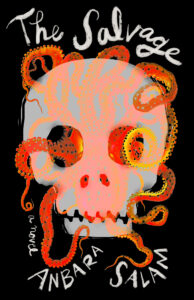
Anbara Salam, The Salvage
Tin House, October 7
Anything that gets comped to Julia Armfield’s chilling and waterlogged Our Wives Under the Sea immediately hits my TBR and Salam’s latest looks like just the thing. It’s historical fiction, set in 1962 in Scotland as a marine archeologist explores a Victorian shipwreck—but stranger things are afoot, and oh yeah the Cuban Missile Crisis kicks off in the background to boot. I can already smell the brine. –DB
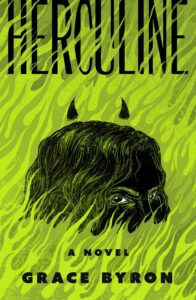
Grace Byron, Herculine
S&S/Saga Press, October 7
A “paranoid, self-annihilating” horror debut that the author elevator-pitched as a “trans girl Buffy”? Yes! I’m excited for this one, especially since I’m already a fan of Byron’s fantastic reviews and longform, in particular her piece for The Nation on a trans vegan cult obsessed with AI, which feels like it may have partially inspired this novel. Herculine follows a woman who escapes NYC and her demons, both literal and figurative, to an all-trans girl commune in Indiana. Naturally, things get a little wild at the rural commune, and our protagonist has to unravel frightening mysteries and contend with “disemboweled pigs, cultlike psychosexual rituals, and the horrors of communal breakfast.” –JF
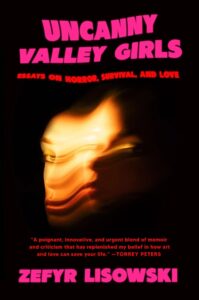
Zefyr Lisowski, Uncanny Valley Girls: Essays on Horror, Survival, and Love
Harper Perennial, October 7
I love the pairing of personal narrative with film criticism, and I thought Lisowski’s Girl Work was excellent. Horror is horrific in part because it brings humans a little too close to ourselves for comfort. It holds a mirror to the parts of us we don’t want to see. But it can also act as a space for solace and interpretation for those who love it, and that seemingly contradictory place is what excites me about these essays. –OS
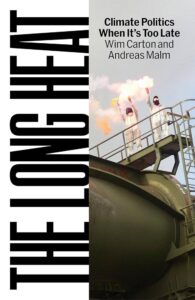
Wim Carton and Andreas Malm, The Long Heat: Climate Politics When It’s Too Late
Verso, October 7
What do we do when those in power resign themselves to accepting climate change as an inevitability? I don’t know! I’m just one person! But I am hoping that reading The Long Heat will help me understand a little better. –OS
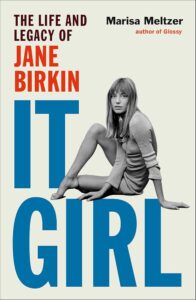
Marisa Meltzer, It Girl: The Life and Legacy of Jane Birkin
Atria, October 7
Hot on the heels of her bestselling cultural history of Glossier, Marisa Meltzer is back with another blended biography and style title, It Girl. Jane Birkin was an icon: a model, an actress, a singer, and one of her most well-known, enduring legacies is the eponymous Birkin bag by Hermes. But Meltzer peels back the layers of Birkin: the style, the image, the name we know so well, and reveals the woman behind it all. Based on her own rigorous reporting, interviews, and research, Meltzer delivers the first comprehensive biography of Jane Birkin to date. –JH
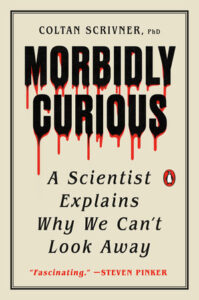
Coltan Scrivner, Morbidly Curious
Viking, October 7
Who doesn’t slow down at a car crash? Need to hear all the gory details of someone’s messy divorce, or cheating scandal? In this book, scientist Coltan Scrivner acknowledges this most gruesome urge, and provides evidence that it is connected to deep and primal survival instincts. The wish to see the worst that life can offer can be a form of self-education, or even preparation, like stockpiling a survival kit. Scrivner blends research, analysis, folk-tales, and pop culture to create a fascinating portrait of the human mind: why we seek the darkness, and what we can learn from it. –JH
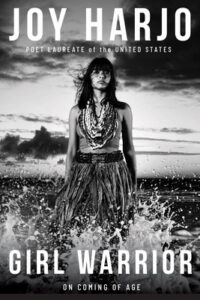
Joy Harjo, Girl Warrior: On Coming of Age
Norton, October 7
With a call-back to her best-selling memoir, Poet Warrior, former poet laureate Harjo has written a guide for young Native women trying to survive and thrive and 21st-century America. Part personal narrative part manual to a life well lived, Girl Warrior is a much-needed counterbalance to the digital churn and overwhelming whiteness of contemporary wellness feminism. –JD
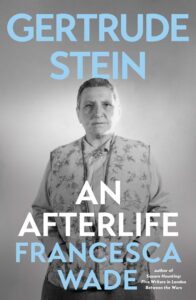
Francesca Wade, Gertrude Stein: An Afterlife
Scribner, October 7
Wade’s first book, Square Haunting, was an incredible collective biography that not only explored the lives of five fascinating women, but captured a specific intellectual and artistic moment in London between the wars. Bringing that sharp eye for cultural iconography to her latest subject, Gertrude Stein, Wade reveals new details about Stein’s relationship with Alice B. Toklas, and dissects the mythos of the high modernist salonniere with a forensic precision hitherto unseen in previous biographies. –JD
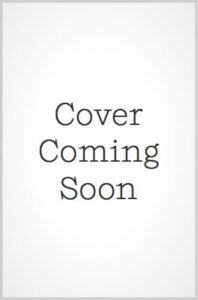
Fatima Bhutto and Sonia Faleiro, eds., Gaza: The Story of a Genocide
Verso, October 7
The ongoing horror of the Palestinian genocide in Gaza, undertaken by Israel and abetted by the United States, livestreamed and posted 24/7 for the uncaring world to see, remains difficult to fully comprehend. So perhaps it is best then, whenever possible, to give Palestinians a voice. Here then is Gaza: The Story of a Genocide, with contributions from some of the greatest Palestinian and Arab writers working today, including Mosab Abu Toha, Susan Abulhawa, Omar Barghouti, Huda J. Fakhreddine, Lina Mounzer, and Mary Turfah. –JD
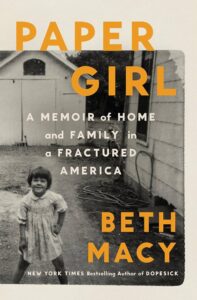
Beth Macy, Paper Girl: A Memoir of Home and Family in a Fractured America
Penguin Press, October 7
In her most personal book yet, the author of Dopesick returns to her hometown of Urbana, Ohio, to find out a simple question—what happened to it? And what happened, by extension, to America itself? I trust Macy to take me anywhere, and to tell me what it all means, even if the truth is hard to hear. –ET
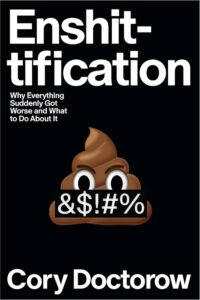
Cory Doctorow, Enshittification: Why Everything Suddenly Got Worse and What to Do About It
MCD, October 7
It’s not just you: the Internet is worse than it used to be. So is the quality of the goods you can buy in a store, and the experience of shopping (online or in person), and the roads, and basically everything. If you’ve spent even a little time online in the last several years, you’ve probably come across Doctorow’s term “enshittification” and now he’s delivering a book on the idea—and, crucially, what we can try to do about it. –DB
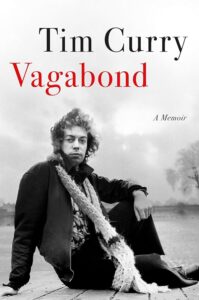
Tim Curry, Vagabond: A Memoir
Grand Central, October 14
Whether he’s harmonizing with Muppet pirates, obsessively pursuing a child through a luxury Manhattan hotel, or just clowning around in the sewers with the denizens of Derry, watching Tim Curry masticate the scenery on screen is a joy forever. Vagabond is a celebration of the Rocky Horror legend’s life and work, and I plan to read it aloud to myself in my best impression of Curry’s mellifluous voice. –DS
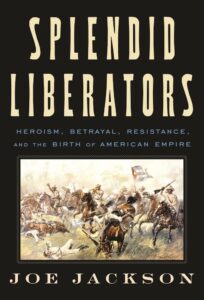
Joe Jackson, Splendid Liberators: Heroism, Betrayal, Resistance, and the Birth of American Empire
FSG, October 14
The end of the 19th century doesn’t get a lot of shine—presidents Garfield, Hayes, Harrison, and Cleveland melt into a blur for all but the most dedicated U.S. history nerds, and McKinley is best remembered for being polite enough to be assassinated so a more bombastic, self-styled war hero could take his place. Still, if you want to understand how our putatively isolationist nation became a colonial empire, that’s the unpopular era you have to dig into. Previous narrative histories like Barbara Tuchman’s The Proud Tower have illustrated that the close of the 19th century was chock full of odd, memorable, baffling characters, which might provide some relief in a historical telling of the U.S.’s first brutal forays into empire-building. –CK
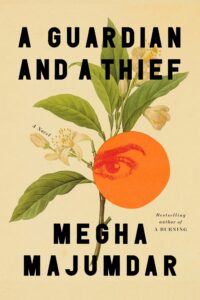
Megha Majumdar, A Guardian and a Thief
Knopf, October 14
Majumdar, author of the fantastic, bestselling novel A Burning, is back with her sophomore effort. In a near-future Kolkata, ravaged by climate change, one family is about to escape, until their visas are stolen. Majumdar follows their story as well as the story of the desperate thief. So it’s basically The Wire at the end of the world. Can’t wait to read this one. –ET
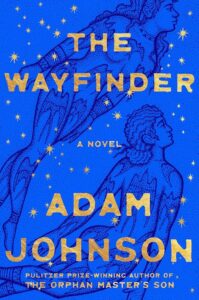
Adam Johnson, The Wayfinder
MCD, October 14
The Orphan Master’s Son author Adam Johnson’s most recent book (Fortune Smiles, which won the National Book Award back in 2015) was, for me, one of the most extraordinary short story collections of the 21stcentury, so I’ve been eagerly awaiting his follow-up for some time now, and it has finally arrived. A 736-page doorstopper billed as an exploration of “indigeneity, ecological balance, and the resilience of humanity,” The Wayfinder is a mammoth historical novel set in the Polynesian islands of the South Pacific during the height of the Tu’i Tonga Empire. It’s the story of Kōrero, a young girl who embarks upon an epic seafaring odyssey to save her people from starvation. –DS
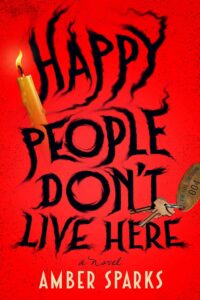
Amber Sparks, Happy People Don’t Live Here
Liveright, October 14
The long-awaited debut novel from Sparks looks like a delightfully autumnal read, about a mother and daughter who move into an apartment building that used to be a sanatorium and the weird people (living and dead) who they encounter there. Everything about it reminds me of Ray Bradbury and Annie Hartnett and I already know I’m going to want to stay in the Pine Lake Apartments forever (and maybe I will???) –DB
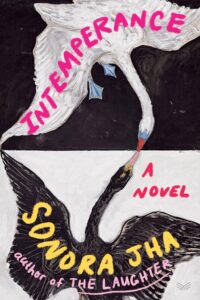
Sonora Jha, Intemperance
HarperVia, October 14
Dating competitions might make you think of reality TV, but Jha’s latest promises a lot more depth and introspection than you’ll see on the tube. Intemperance is about a woman who decides to spice up her 55th birthday with a competition for her love, inspired by the ancient Indian tradition of swayamvar, where potential partners vie to win a woman’s hand in marriage. The contest in Jha’s book becomes a magnet for people both supporting and protesting the project, from an inspired wedding planner to an aggrieved mens rights activist. I’m especially looking forward to reading these characters: as a former journalist, Jha has an excellent eye for evocative character detail. –JF
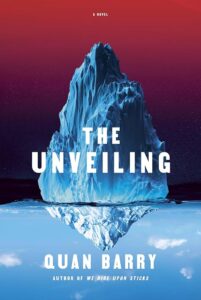
Quan Barry, The Unveiling
Grove, October 14
I think, actually, that Quan Barry can do anything. As longtime readers of this site may remember, I loved her exuberant, ridiculously fun novel We Ride Upon Sticks (’80s New England, girls field hockey, magic?). I also loved her contemplative When I’m Gone, Look for Me in the East (monks, brothers, Mongolia). Did I mention she’s also a celebrated poet, and a beloved professor of same at the University of Wisconsin-Madison’s MFA program? Her latest novel is another left turn, a work of literary horror set in Antarctica, in which a Black location scout for a production company making a film about the Shakleton expedition and then winds up stranded with a bunch of white people…and also something else. Yes, please, thank you. –ET
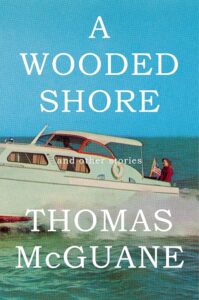
Thomas McGuane, A Wooded Shore: And Other Stories
Knopf, October 14
Patron saint of Montana fiction Thomas McGuane is one of America’s true short story titans (I have no idea how many stories he has published in the New Yorker, but it’s a lot), and at eighty-five seems to be showing no sign of slowing down. His latest collection, A Wooded Shore, consists of nine wryly comic tales of men “on the outskirts of America, habituating the motels, hot dog stands, and dive bars time forgot, grappling with a world that is swiftly changing, and dreaming of a return to the wooded shores of their youth.” –DS
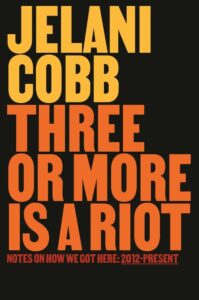
Jelani Cobb, Three or More Is a Riot: Notes on How We Got Here: 2012-Present
One World, October 14
The subtitle says it all. Jelani Cobb, celebrated New Yorker staff writer, delivers a themed collection of new and selected pieces stretching back to 2012 and, in so doing, attempts to put some kind of narrative onto the tumult of the last 13 years. If anybody can do it, Cobb can. –DB
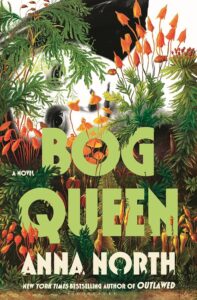
Anna North, Bog Queen
Bloomsbury, October 14
Bog wives, bog bodies—and now bog queens! Bogs, the bodies they hold, and the people who love them remain fascinating and I’m excited to see what Anna North does with them all, particularly after her delightful feminist riff on Westerns in Outlawed. This one purports to bounce between the present as a body is uncovered from a bog and the Iron Age story of how that body got there, and I’m all in already. –DB
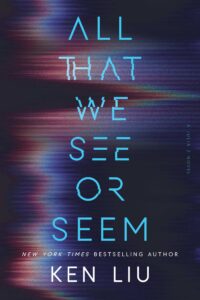
Ken Liu, All That We See or Seem
Saga Press, October 14
New Ken Liu!! New Ken Liu!! On the heels of his recent translation of the Dao De Jing, Liu returns to original speculative fiction with this series opener that follows a famous “orphan hacker” as she tries to help save a kidnapped ‘dream artist’ who can manipulate shared virtual landscapes. It sounds like a great technothriller and Liu, one of our great speculative minds, is a sure-fire bet for a good time. –DB
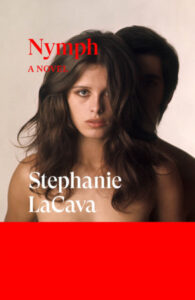
Stephanie LaCava, Nymph
Verso, October 14
LaCava’s new book is a thriller and love story about a young assassin with dangerous habits, trying to outrun her past and navigate life as a student in New York. LaCava’s last book, I Fear My Pain Interests You, was raw, sexy, and cool, full of sharp observation despite the spare prose. Nymph sounds like it has a similarly austere and violent premise, and will move just as fast: LaCava’s work is like a razor. –JF
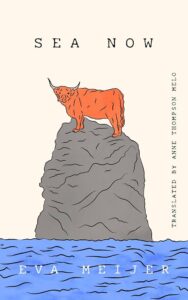
Eva Meijer, tr. Anne Thompson Melo, Sea Now
Two Lines, October 14
A new entrant in the “what do we do when the waters rise?” canon of climate fiction, from the polymathic Meijer (in addition to being a novelist, she’s a philosopher and a cross-species linguist, among other things). Although stories about the end of the world as we know it inherently feel a bit bleak, this one (about three women who take a boat out over a fully flooded Netherlands) looks like it could give some hope too—or at least encourage us to take another look at the resilience of the natural world. –DB
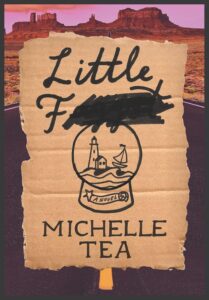
Michelle Tea, Little F
Feminist Press, October 14
The Feminist Press introduced me to Michelle Tea with the great Black Wave and I’m excited to see what her new novel brings. Jacket copy suggests an American road novel heading from Arizona towards Provincetown with two teenage queer runaways—and one of them is apparently a witch? Sign me up. –DB
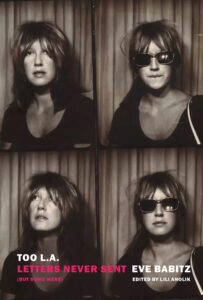
Eve Babitz, ed. Lili Anolik, Too L.A.: Letters Never Sent (But Some Were)
NYRB, October 14
Babitz’s LA is such an era. I love reading about it, and this feels like such an intimate window into an already fascinating space. –OS
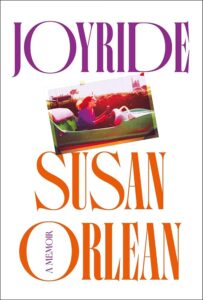
Susan Orlean, Joyride
Avid Reader Press, October 14
When I was 13 years old I precociously pick up The Orchid Thief from the front table in Barnes and Noble. I’ve been a very honest “fan” ever since. Susan Orlean’s memoir promises insight not only into her start at alt-weeklies, her journalism, and her brilliant narrative nonfiction works, but also provides a blueprint for how to live a creative life. “Orlean inspires us to seek out daily inspiration and rediscover the marvels that surround us.” –EF
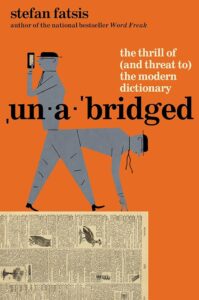
Stefan Fatsis, Unabridged: The Thrill of (and Threat To) the Modern Dictionary
Atlantic Monthly Press, October 14
If you’re reading this website, I assume you, too, are a word nerd (sorry). Stefan Fatsis, though, has taken lexicographical obsession several steps further in his deep dive into the dictionary, embedding as a lexicographer-in-training at Merriam-Webster to learn the secrets of those who curate our language. –JG
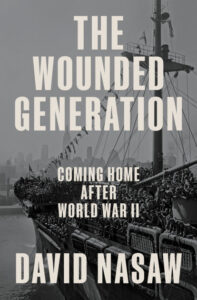
David Nasaw, The Wounded Generation: Coming Home After World War II
Penguin Press, October 14
You’ve heard about the long 19th century, which supposedly began with the 1789 French Revolution and ended with WWI; I think it was longer. I don’t believe the 20th century really began until 1945. With that in mind, I’m really looking forward to this examination of America in the immediate aftermath of the war. Most popular history skips from Hiroshima to the economic boom of the 1950s—with maybe a sprinkling of the Marshall Plan in between—but our society was fundamentally reorganized by the war. In times of political upheaval, it’s important to remember that there’s always an aftermath—and how that aftermath is handled can have an enormous impact on the future of the nation. –CK
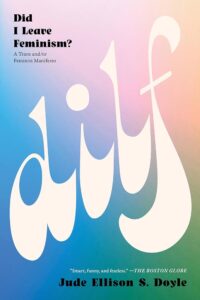
Jude Doyle, DILF: Did I Leave Feminism?
Melville House, October 14
Despite what right-wing propagandists want you to believe, trans liberation and women’s liberation are inseparable concepts (and not just because plenty of trans people are also women). Bodily autonomy, self-determination, and the right to privacy are centered in all of our movements, and books that consider these topics from trans masculine perspectives are few, but necessary. –OS
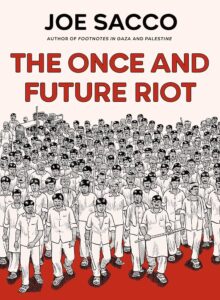
Joe Sacco, The Once and Future Riot
Metropolitan Books, October 14
From the cartoonist who brought us Palestine (2001), Footnotes in Gaza (2009) and, most recently, War on Gaza (2024) comes a searing interrogation of the 2013 sectarian riots in Uttar Pradesh, India, that explores “the mechanics, dynamics, mythologies, uses, and abuses of political violence everywhere.” I’ve been an avid follower of Sacco’s work for years now. He’s someone who has more than earned the moniker of “greatest living comics journalist,” and The Once and Future Riot promises to be another painfully beautiful work of investigative journalism. –DS
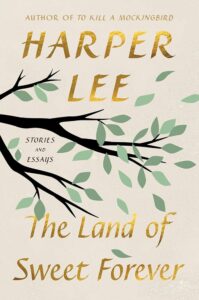
Harper Lee, The Land of Sweet Forever
Harper, October 21
Yes, that Harper Lee. This collection of newly unearthed stories, essays, and articles promises a fresh perspective on the author of To Kill A Mockingbird. Alongside a framing introduction by Lee’s biographer Casey Cep, the collection traces Lee’s life from post-WWII Alabama to midcentury New York City, highlighting her early short fiction and later nonfiction magazine work for McCall’s, Vogue, and more. –JF
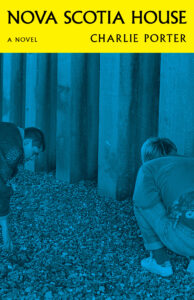
Charlie Porter, Nova Scotia House
Nightboat, October 21
Charlie Porter’s fashion journalism has been on my radar for a while. And I was most intrigued by his last book, which analyzed the style inherent to the Bloomsbury group. Porter’s debut novel takes that interest in playful forms to bold new places. Unfolding at the height of the AIDS crisis in 90s London, this diaristic reflection thrusts us right into our narrator’s skull, so we seek, remember, and mourn right along with Johnny Grant. Writing for Vogue, Anna Cafolla framed the book’s central question nicely. In the aftermath of profound disaster, “How can we connect again with radical queerness and countercultural ideas of living?” –BA
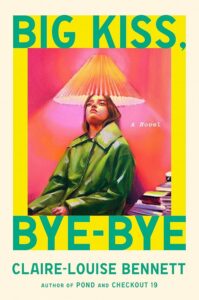
Claire-Louise Bennett, Big Kiss, Bye-Bye
Riverhead, October 21
From the always inventive and fascinating author of Pond and Checkout 19, to my eye one of the most exciting writers currently working, comes a new novel about love, and the lack of love, and the communications and miscommunications between those closest to us. The human condition, in other words. Which might mean anything, but, who cares, it’s a Bennett novel, so I expect it to be brilliant and careful and river cold. Can’t wait. –ET
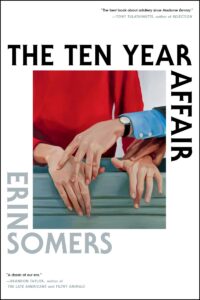
Erin Somers, The Ten Year Affair
Simon & Schuster, October 21
Cora and Sam meet in a baby group, and though happily married young parents, the chemistry is undeniable. As their lives intersect and intertwine, their worlds—and the novel—unravel into two parallel timelines: one where they pursue their feelings, and one in which they don’t. How could you not want to read a will-they/won’t they novel where both timelines actually play out? Can’t wait. –EF
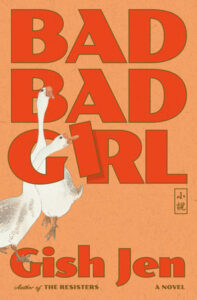
Gish Jen, Bad Bad Girl
Knopf, October 21
Gish Jen is the absolute master of extremely funny devastation, and this novel—which centers on the tumultuous relationship between a mother and her daughter—is the perfect showcase for her skills. Aggie, born in Shanghai in 1925 to a wealthy family, moves to the US in 1947 to pursue a PhD. She marries and has a daughter, Gish, with whom she struggles in a way that feels too familiar. It’s described as an “engrossing, blisteringly funny-sad autobiographical novel,” which… yes. –JG
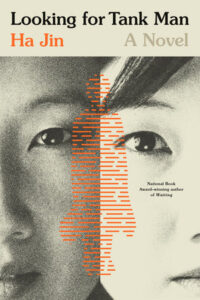
Ha Jin, Looking for Tank Man
Other Press, October 21
From the National Book Award winning author of Waiting comes a novel for our times: a coming-of-age story about protest, in which a Chinese student at Harvard stumbles on the obscured history of the Tiananmen Square massacre. –ET
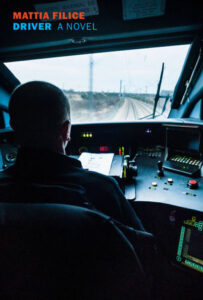
Mattia Filice, tr. Jacques Houis, Driver
NYRB, October 21
I’m intrigued by this book, which is a novel about a high-speed train driver in France—written from personal experience—blending prose and verse and other cacophonies. It’s billed as “a book about work, about the romance of the rails, but also about the tedium and intensity of doing such a job day in and day out, as well as the workers’ continual struggle to improve their working conditions through strikes and protests.” Solidarité. –ET
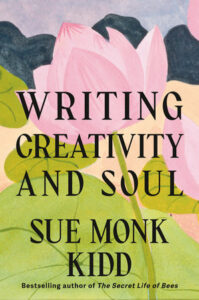
Sue Monk Kidd, Writing Creativity and Soul
Knopf, October 21
The bestselling author of The Secret Life of Bees is releasing a craft memoir: reflections on what it is to be an artist, and how she has made a life of her art. Kidd believes firmly in the spiritual nature of being a writer, on the divine center from which creativity can spring, and she offers lessons, advice, thoughts and her own philosophical musings about the subject. One expects to walk away from this title a little more in tune with the burning core of our own artistic selves, and a wish to share it with the world. –JH
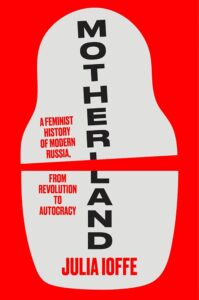
Julia Ioffe, Motherland: A Feminist History of Modern Russia, from Revolution to Autocracy
Ecco, October 21
Motherland is award-winning journalist Julia Ioffe’s hybrid memoir/historical account of feminism in Russia. Tracing her personal relationship to feminism and the larger history of feminism in Russia, this book is both intimate and vast. From Lenin’s revolutionary lover to Pussy Riot to Putin, Ioffe explores Russian history from a feminist lens and attempts to answer the question: how did we end up here? –MC
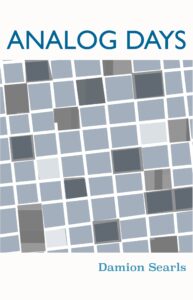
Damion Searls, Analog Days
Coffee House Press, October 21
I’m a big fan of Searls’ translation work—see the Fosse entry above!—so I’m very curious to read his own debut novella, in which a group of friends at a cultural inflection point (2016, uh oh) “fall back on film and friendship and art as the last bastions of meaning in their fragmented lives.” Now more relatable and more timely than ever. –ET
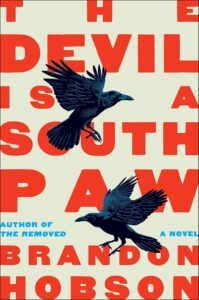
Brandon Hobson, The Devil is a Southpaw
Ecco, October 28
Anytime I see the phrase “a novel within a novel,” I’m already hooked. Hobson’s latest follows Milton Muleborn, a man who has been jealous of his friend Matthew Echota, a talented Cherokee artist, ever since they were children in a juvenile detention center. Devil Is a Southpaw is partly Muleborn’s novel about he and Echota’s childhood, and partly Muleborn’s adult musings about the ways their imprisonment shaped the boys and their friendships. This book sounds fascinating and fresh and beautifully written. –MC
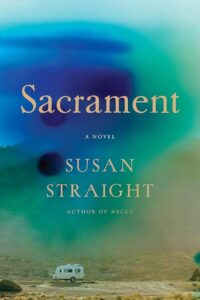
Susan Straight, Sacrament
Counterpoint, October 28
The question of what constitutes the COVID novel canon will probably be debated forever, but there’s no doubt that Susan Straight’s new book about ICU nurses will be one of them. Sacrament dives right into the nadir of the 2020 health crisis, following a group of nurses who have moved into makeshift housing near a California hospital, to isolate from their families during the height of the case surge. In the midst of the tremendous risk they put themselves in to protect their families, their lives back home become more complicated, and older griefs dovetail with fresh ones. –JF
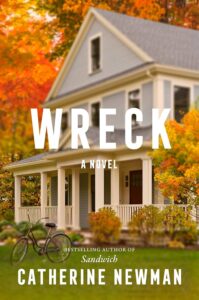
Catherine Newman, Wreck
Harper, October 28
Catherine Newman has my heart: We All Want Impossible Things made sure of that, and now I’m here for the ride. Wreck is the follow up to Sandwich, a recent bestseller orienting around a middle-aged woman named Rocky, a funny, anxious, spirited, and relatable protagonist on vacation with her parents, her husband, and their young adult children. In Wreck we witness those beloved characters two years later. Some changes have occurred. Her mother has passed away, her daughter is in college. And much is still the same: she wonders about marriage, about lineage, about how to be both the person a family demands of her, while still being herself. Newman is my dream writer, and she channels the perfect cocktail of humanity into her characters, especially Rocky. Rocky is funny and dry and emotional and sometimes crazy and always loving, so loving, of her family, even as she struggles and panics. It’s a gift to get to be on the quest with her, and learn alongside her, about how to be alive, to be a person, to be good, to be worthy. –JH
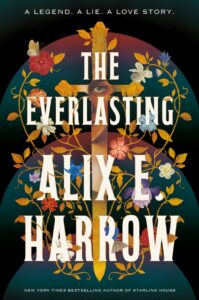
Alix E. Harrow, The Everlasting
Tor, October 28
Harrow-heads already know that she’s one of the best fantasy writers working—but this new book is a time-twisting Courtly Romance (an academic is thrown back in time to accompany his country’s most famous knight on her final crusade) with sneaky-deep reflections on storytelling, truth, power, and love that promises to be her best yet. I’ll follow Alix Harrow wherever she goes. –DB
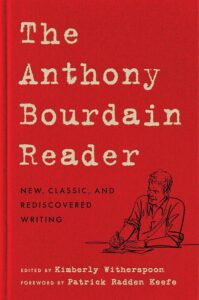
Anthony Bourdain, The Anthony Bourdain Reader
Ecco, October 28
To add to the already hefty material of Bourdain-related media out there, here is a new compilation of all Bourdain’s writing, perfect for the connoisseur (or the obsessive). But there should be something for everyone here—Bourdain’s wisdom and musings ranged far and wide. He wrote about culture, about identity, place, about food, endlessly food, while acknowledging everything that food represents. He was a specific and respected voice, who left us with a lot to read, a lot to chew on. –JH
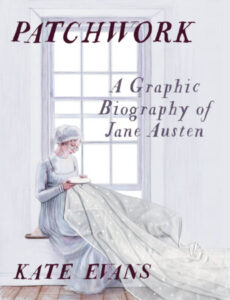
Kate Evans, Patchwork: A Graphic Biography of Jane Austen
Verso, October 28
I’m an Austen fan who loved Kate Evans’s Red Rosa, so I’m basically the target audience here. Particularly, I’m excited to see how Austen’s patchwork quilt is handled as a storytelling device, and what that means for the book’s artwork, panel to panel. It’s so cool when narrative and form meet. –OS
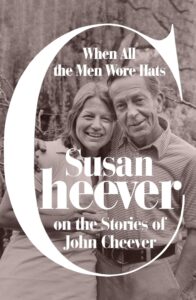
Susan Cheever, When All the Men Wore Hats: Susan Cheever on the Stories of John Cheever
FSG, October 28
There’s such a difference between writing about a parent and writing about that parent’s writing. It almost feels more personal and vulnerable to me, to view that relationship through the lens of the work and how that work came to be. –OS
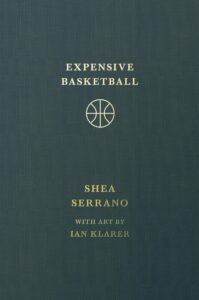
Shea Serrano, Expensive Basketball
Grand Central, October 28
It’s tricky to write about something that looked cool. For example, that last sentence was a dud. This may be why most sportswriters stick to the well-trod path of objective coverage, allowing themselves scant editorializing beyond describing a player’s “explosive” thirty-point half or, as a playoff indulgence, tossing in the odd “miraculous” to describe a game-winning play. Shea Serrano does not write about sports that way.
Serrano is one of the few writers whose on-the-page enthusiasm is infectious, who can describe a particular spin move executed during a regular season game from 2006 and successfully transfer his excitement about it to the reader—even if you didn’t watch that game, never cared about that team, are only hearing about that player for the first time. I wouldn’t trust most writers to carry that off for the length of a full book; in this case, I have no doubt it’ll be a blast. –CK
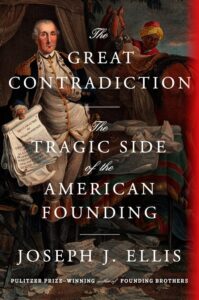
Joseph J. Ellis, The Great Contradiction: The Tragic Side of the American Founding
Knopf, October 28
A deep dive from historian Ellis—author of the Pulitzer Prize–winning Founding Brothers and the National Book Award-winning American Sphinx—on how America’s founders debated, rationalized, and thought about the issue of slavery while drafting the Declaration of Independence and the Constitution. Stacy Schiff calls it “an elegant, concise volume that illuminates the obfuscations, misunderstandings, and hypocrisy that continue to sabotage us today.” –ET
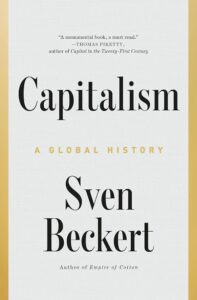
Sven Beckert, Capitalism: A Global History
Penguin Press, October 28
Sure, some of us might think the origins of modern capitalism can be traced directly to a few counting houses in 16th-century Amsterdam but apparently it’s more complicated than that. According to prize-winning Harvard historian Beckert’s latest, capitalism manifested around the world, at different times, from China to Africa and beyond. (So basically it’s everybody’s fault.) –JD
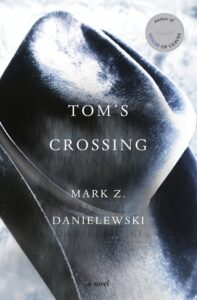
Mark Z. Danielewski, Tom’s Crossing
Pantheon, October 28
The announcement of a new Mark Z. Danielewski book is the sort to get the literary world talking—and the fact that it is a 1200+ page Western without (so far as I can tell) any of his usual meta-textual typographic trickery or design acrobatics leaves me wondering just what on earth I can expect. But I’m eager to find out what two friends saving two horses from slaughter in Utah in the 80s looks like from the mind that brought us House of Leaves. –DB
November
Oyinkan Braithwaite, Cursed Daughters
Doubleday, November 4
At last, a new novel from the author of the almost unbearably fun My Sister, the Serial Killer. In Braithwaite’s latest, a young woman named Eniiyi is juggling two curses: the first being that she’s the incarnation of the cousin that died on the day Eniiyi was born (and therefore doomed), and the second being the family curse: “No man will call your house his home. And if they try, they will not have peace…” But when she falls in love, she will have to find a way to break both. –ET
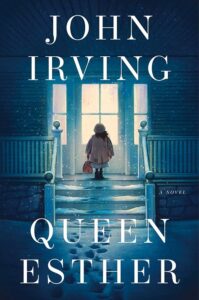
John Irving, Queen Esther
Simon & Schuster, November 4
John Irving’s The World According to Garp (1978), The Hotel New Hampshire (1981), and The Cider House Rules (1985), were extremely formative novels for me as a younger man, so much so that I’ve been afraid to return to them, here in my grizzled almost middle age, for fear of being disappointed. Happily, I reread New Hampshire for the first time in nearly two decades last year and found it to be every bit as moving and transporting as I remembered (if, naturally, a wee bit dated in parts). Irving remains one of the greatest living Dickensian novelists, and I will be first in line to pick up a copy of Queen Esther, a sequel (after 40 years!) to The Cider House Rules, in which beloved Maine orphanage doctor Wilbur Larch takes in Esther—a Viennese-born Jew whose life is shaped by anti-Semitism. –DS

Margaret Atwood, Book of Lives: A Memoir of Sorts
Doubleday, November 4
One of the most influential and important writers of her generation has finally written a memoir! (“Of sorts”? Peggy, what are you saying?). And not only does Atwood cover the arc of her 85 years, give or take, she makes explicit the connections between moments in her life and the art she has gifted us all. –JD
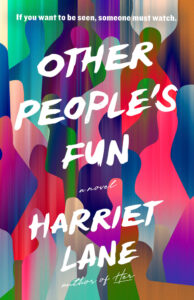
Harriet Lane, Other People’s Fun
Little, Brown, November 4
Single White Female is a genre unto itself. It can be adapted a thousand times a thousand ways and never lose its appeal; a dubiously platonic seduction, rapid intimacy, a slow but inexorable pivot toward something more sinister as the two main characters invade one another’s privacy until the notion that they’re two distinct people begins to wobble. Sign me up for it every time. –CK
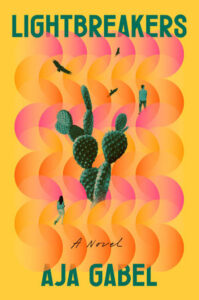
Aja Gabel, Lightbreakers
Riverhead, November 4
Aja Gabel’s follow-up to her acclaimed 2018 novel The Ensemble sounds absolutely fascinating. Lightbreakers is the story of Maya and Noah, an artist and a quantum physicist whose happy marriage is put to the test when an eccentric billionaire invites Noah to participate in a secret project, deep in the desert, to unravel the secrets of time and consciousness. Sinister labs. Time travel. Lost daughters. Old flames. Sign me up. –DS
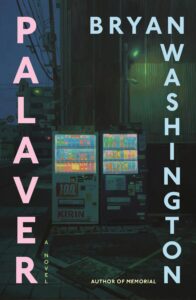
Bryan Washington, Palaver
FSG, November 4
Washington is almost sure to continue his exceptional run with this new novel—another intimate epic of food, family, and queer love. I love that he continues to return to similar locations (Tokyo, Houston) and ideas (see above), but that each time continues to feel fresh and vibrant and wonderfully human. I could read a hundred variations on these themes, especially when handled with the deftness that Washington brings. –DB
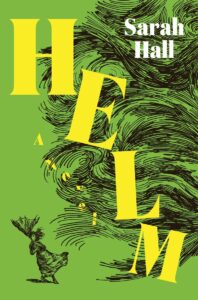
Sarah Hall, Helm
Mariner, November 4
Helm is a mix of environmental caution and myth, following a wind named Helm, “part-elemental god, part-aerial demon” that mischievously trips through history. Hall follows this trickster god from the Neolithic to the modern days, and how humans tried to placate and control this wind. This premise reminds me a bit of George R. Stewart’s Storm, but with a more folkloric spin: a creative way to examine how humanity and nature relate, and how all life is knotted together. –JF
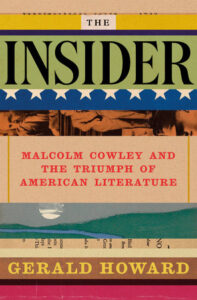
Gerald Howard, The Insider
Penguin Press, November 4
A book by a legendary editor about a legendary editor The Insider tells the story of Malcolm Cowley, the 20th century’s preeminent literary scenester. Cowley made his name in Paris as part of the Lost Generation, rubbing elbows with and championing the likes of Hemingway, Fitzgerald, and Dos Passos (an era he chronicles with wonderful panache in Exile’s Return); he would go on to be a literary presence both among the Beats and in the counterculture scene of the 60s, exerting his influence on American literature in a way hitherto unexplored. –JD
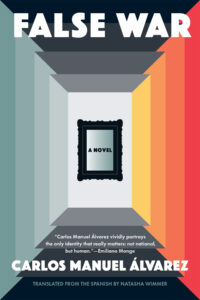
Carlos Manuel Álvarez, tr. Natasha Wimmer, False War
Graywolf, November 4
Carlos Manuel Álvarez is a tremendously exciting and engaged writer, and his fiction and essays never stray far from the world. His first novel The Fallen was a portrait of contemporary Cuba as seen by one crumbling family. It was beautifully dreamy and detailed, pairing acute political observations with a deep well of sympathy. His new book is more formally experimental, a fractured string of narratives and portraits moving across the globe—Cuba, Mexico, America, France, Germany—to meet ordinary and extraordinary barbers, thieves, and academics. I’m excited to see what he does with this looser form. –JF
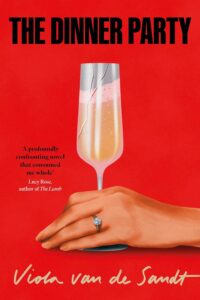
Viola van de Sandt, The Dinner Party
Little, Brown, November 4
Even under the best circumstances, hosting a dinner party is a stressful job. But hosting a dinner party for your family-money-wealthy English boyfriend and his colleagues during a heatwave when the fridge breaks, alcohol flows, and an unexpected guest shows up? That’s some new form of torture. It’s so fun when I get to yell “dump him!” at a book, and I think The Dinner Party will be a “dump him!” type of book. But it also sounds raw, compassionate, and compelling—what a beautiful world we live in where a book can be messy and tender all at once. –MC
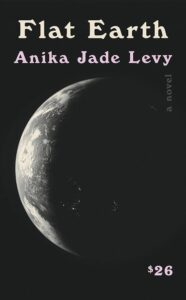
Anika Jade Levy, Flat Earth
Catapult, November 4
A new contender for the voice of Gen Z: Anika Levy’s debut novel Flat Earth will capture our attention, at least for as long as our warped attention spans will allow it. Conjuring the ennui that defines the current age, Levy tells the story of two friends, their sameness, and their differences: differences in class, in ambition, in success, in ability, and the desperation that can come from growing older, and being forced to face one’s own reality. No matter what changes in generations, no matter the specific difficulties that young people must contend with in the face of technology, war, politics, environmental devastation: nothing will change the heartbreak and fraught intimacy of female friendship in its ups and downs. –JH
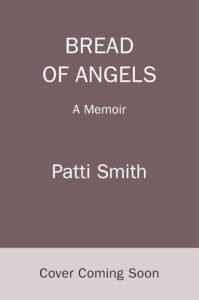
Patti Smith, Bread of Angels: A Memoir
Random House, November 4
Smith’s new memoir is pitched as a life-spanning look at her creative practice, from her childhood imaginings to her teenage poetry to her life with Fred “Sonic” Smith and through to the present. Fans of Just Kids and M Train can look forward to a return-to-form after the more experimental and elliptical Year of the Monkey and Book of Days. –DB
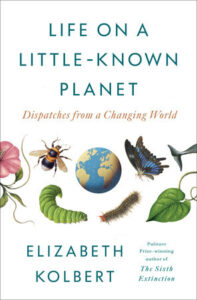
Elizabeth Kolbert, Life on a Little-Known Planet: Dispatches from a Changing World
Crown, November 4
Kolbert is one of our most important and lucid voices on climate change, and she’s been ringing the bell for longer than most. This book, which collects her “most important pieces about climate change and the natural world,” will be essential. –ET

Char Adams, Black-Owned: The Revolutionary Life of the Black Bookstore
Tiny Reparations Press, November 4
Char Adam’s book is not only a love letter to Black bookstores, but also a deeply reported history of their role in the history of Black political movements. A story at the intersection of literature and liberation, Black-Owned will be a must-read for anyone who believes in the power of books. –JG
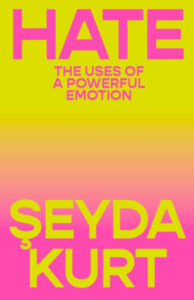
Şeyda Kurt, Hate: The Uses of a Powerful Emotion
Verso, November 4
Hate, you say? I know something about that, but probably not enough. In this international bestseller, Kurt argues for the productive side of this much-maligned emotion, and the way it can be used to fuel action, resistance, and perhaps even a new kind of care. Which is good, because these days I find I might need some help directing all these Bad Bad feelings. –ET
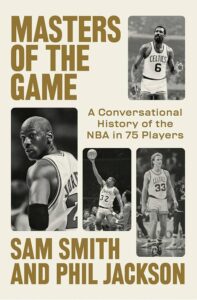
Sam Smith and Phil Jackson, Masters of the Game: A Conversational History of the NBA in 75 Players
Penguin Press, November 4
The NBA is unique among the professional sports popular in America because of its focus on individual guys. Baseball is about aggregate numbers and statistical aberrations; football is about simulating the violence and strategy of warfare; NBA basketball is about a handful of guys—no hats, no helmets, just dudes in shorts—defying the laws of physics for 48 minutes at a clip. Phil Jackson is both an NBA legend (first as a player, then as a coach and a front office executive) and a certified oddball. If he wants to share his thoughts on NBA history through the lens of “remembering some guys,” I’m going to listen. –CK
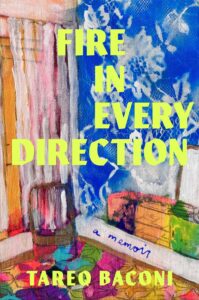
Tareq Baconi, Fire in Every Direction
Washington Square Press, November 4
Tareq Baconi—the brilliant Palestinian scholar, activist, and author of Hamas Contained: A History of Palestinian Resistance—has written a beautiful memoir of awakenings, both queer and political, chronicling the marks left by his family’s forced exiles (first from Palestine in 1948, and later from Beirut in the late 1970s) and his own reckoning with what it means to “live in liminal spaces, and rethink the meaning of home.”

Brad Fox, Another Bone-Swapping Event
Astra House, November 4
Sometimes a book’s title is sufficiently striking, and its subject—in this case, traditional medicine and the jungles of Peru—sufficiently unfamiliar to me, that it instantly lands a spot on my TBR. This is one of those times. –CK
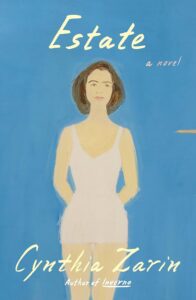
Cynthia Zarin, Estate
FSG, November 11
Estate is our second novel from Cynthia Zarin, who I knew first as a poet and essayist. All three forms—fiction, poetry, and essay—feel present in this sweeping reflection from a troubled heart. Following the recently separated Caroline as she falls into a stressful love with the charismatic Lorenzo, the book bounds around in our narrator’s memories, trying to pin down the problem of desire. Opening pages have me thinking of Annie Ernaux, Sigrid Nunez, or Deborah Levy—for the montage diary style, and frequent references to fellow women in crisis (Nina Simone, Ada Lovelace, icons of Italian cinema). –BA
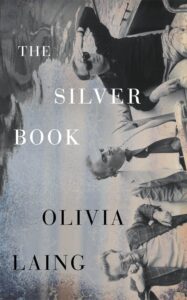
Olivia Laing, The Silver Book
FSG, November 11
I fell for Olivia Laing’s non-fiction first. They’ve made a hypnotic project of deep-reading artists in poetic group biographies like Funny Weather, and works of hybrid-memoir, like The Lonely City. At first I wasn’t sure that reporter’s gaze would cross the pond to fiction. But if Laing’s debut novel Crudo is anything to go by, that relentless curiosity drives a story as well as a remembrance. The Silver Book is set in the film world of 70s Venice, and enlists Pasolini and Fellini as characters. Pitched as a noir-ish queer love story, this one looks as sumptuous and specific as its predecessors. Can’t wait. –BA
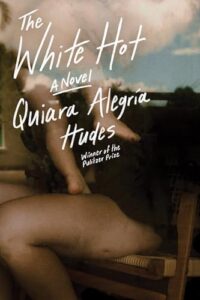
Quiara Alegria Hudes, The White Hot
One World, November 11
The debut novel from the Pulitzer-and-Tony-winning playwright is sure to be one of the hot fiction titles of the fall. It promises to be a journey of self-discovery, structured as a letter from a teen mother to her daughter, to be opened once the daughter turns 18—and I have no doubt that Hudes will deliver a gripping, beautiful, and poignant read in her turn to fiction. –DB
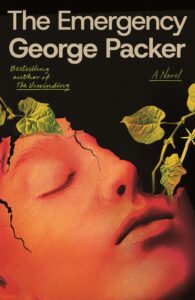
George Packer, The Emergency
FSG, November 11
The latest novel from Packer, who is renowned for his bestselling and award winning nonfiction, concerns a civilization that has “fallen apart from boredom,” which is interesting enough on its face, and the man who, after falling from grace in the new society, embarks on a dangerous redemption quest with his teenage daughter. Sounds good. –ET
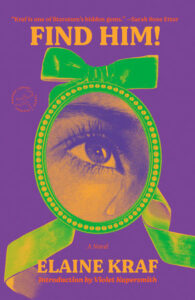
Elaine Kraf, Find Him!
Random House, November 11
Elaine Kraf’s work has mostly fallen out of print, with the exception of her cult feminist classic The Princess of 72nd Street that was reissued by Dalkey in 2020, and this new reprint of Kraf’s uncanny 1977 mystery is a much needed correction. Find Him!’s narrator claims to be from “another star,” arriving without the ability to care for herself or speak. A man named Oliver tends to her, and his role is confusing: he’s a caretaker, a lover, a teacher, and a captor. The narrator’s live gets more complicated as she gains more autonomy and as she starts reexamining her life. It’s a powerfully eerie book, and one I’m glad will be finding a wider readership. –JF
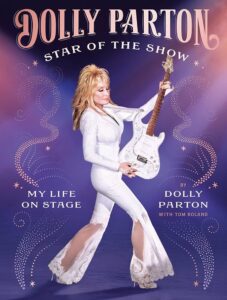
Dolly Parton, Star of the Show: My Life on Stage
Ten Speed Press, November 11
Let’s be real. I don’t have to sell you on Dolly Parton. America’s sweetheart doesn’t need any more good press from anyone—I’d bet my fortune that she could be elected Queen of Tennessee, Constitution-be-darned, if elections were held today. The third installment of her deluxe photo-biography arrives this autumn. And where the previous two books focused on lyrics and fashion, Star of the Show takes general appraisal of Parton’s, well, starriness. I’m expecting juicy backstage anecdotes and sweet-tea-sweet wisdom in this well-earned victory lap. –BA
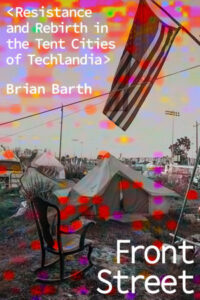
Brian Barth, Front Street: Resistance and Rebirth in the Tent Cities of Techlandia
Astra House, November 11
It’s certainly no secret that an incredible hostility against unhoused people exists in the United States. Accounts that not only explore how our system has failed its people but also humanize our neighbors and comrades as they organize and support one another are so important, particularly against the backdrop of Silicon Valley. –OS

Daniel Swift, The Dream Factory: London’s First Playhouse and the Making of William Shakespeare
FSG, November 11
Getting into the weeds about the material conditions under which Shakespeare wrote the majority of his work is interesting enough to warrant a mention on this list. As a companion to Stephen Greenblatt’s Dark Renaissance, which dives into the very different ways Christopher Marlowe (probably) made his living, this summer promises to be bountiful for those of us prone to droning on about the historical context of classic literature. –CK

Jen Percy, Girls Play Dead: Acts of Self-Preservation
Doubleday, November 11
Jen Percy’s reporting about war, trauma, addiction, and extremism is some of the best around. Her 2016 piece about the loved ones of those lost in Japan’s tsunami who continue to search for them at sea is one of the most profoundly moving pieces of writing about grief I’ve ever encountered. I’m anxiously awaiting her second book, on passivity and women’s survival strategies. –JG, as recommended in our first-half of 2025 list
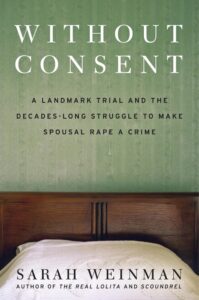
Sarah Weinman, Without Consent: A Landmark Trial and the Decades-Long Struggle to Make Spousal Rape a Crime
Ecco, November 11
The NYTBR’s mystery & crime columnist returns with another work of reported non-fiction, tracking the progress (all too recent, all too little) of making spousal rape into a crime, starting with the first attempted lawsuit in 1978 through the present. It’s a shattering reminder that for all the progress we’ve made, this country’s deeply engrained history of misogyny and violence continues to prove a danger to us all. –DB
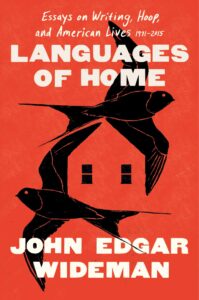
John Edgar Wideman, Languages of Home: Essays on Writing, Hoop, and American Lives 1971-2024
Scribner, November 18
I’m ashamed to report to you, good literary establishment, that I’ve never read any John Edgar Wideman. He’s one of those writers I’ve weirdly circled for years, collecting his novels and letting them linger in my TBR pile for no particular reason. I know he’s a peer or mentor to many authors I adore, and I know he always comes off lovely in interviews. But for whatever reason, the stars haven’t aligned for us yet. But I think that ends this fall.
This year, we’re getting a first of its kind collection of Wideman’s essays and criticism. The book will span fifty years and dozens of subjects. Expect the novelist’s hot takes on everything and body from Michael Jordan to the end of the Civil Rights Movement. I love this kind of roving introduction to a mind, so sign me up. –BA
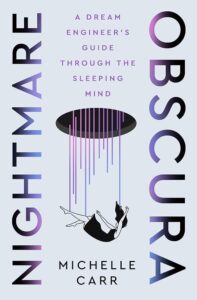
Michelle Carr, Nightmare Obscura: A Dream Engineer’s Guide Through the Sleeping Mind
Henry Holt, November 18
A book about the science behind dreams sounds like a, uh, dream for writers (poets, I’m looking at you). In Nightmare Obscura, dream researcher Michelle Carr dives into the mechanisms of dreams and nightmares, and explores the relationship between our sleeping and waking minds. Granted, I don’t actually know what dream engineering is, but my interest is piqued. –JG
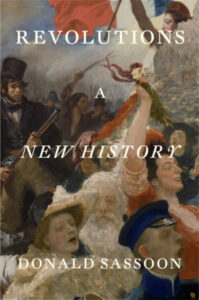
Donald Sassoon, Revolutions: A New History
Verso, November 18
A big book on a big idea: what is revolution? Sassoon reexamines some of the most famous political upheavals in history, from England, America, France, Italy, Russia, and Germany, taking on the topic of revolution from many angles and historical moments. Sasson is able to work on a grand scale, and he’s not afraid to take big swings with his analysis. But I wouldn’t be scared off if you’re not a fan of academia: he also has an excellent eye for sparkling anecdotes and character sketches. The details highlight the rich ironies and contingencies of history, which are always present in Sassoon’s work. –JF
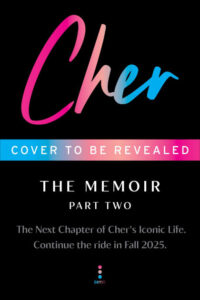
Cher, Cher: Part Two
Dey Street, November 18
The second installment of Cher’s memoir ought will scratch your itch (or mine, anyway) for juicy celebrity storytelling. Of course, I’ll be ingesting it in audiobook version to get the full Cher experience. My house is about to be so clean. –JG

Tracy K. Smith, Fear Less: Poetry in Perilous Times
Norton, November 18
Pulitzer Prize-winning poet laureate Tracy K. Smith, one of my personal favorites, is blessing us with a volume about reading and writing poetry—in “perilous times” and otherwise (though one might argue all times are perilous). It contains discussions of craft and Smith’s own personal practice, close readings, and a argument for poetry as both a bridge to others and a way of understanding ourselves. She’s brilliant; I will be reading. –ET
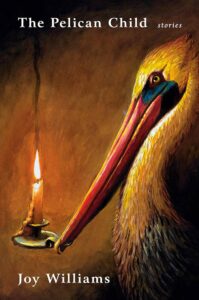
Joy Williams, The Pelican Child: Stories
Knopf, November 18
There’s nobody quite like Joy Williams. No one is as funny and as bleak in the same sentence, or maybe even the same word. Her latest is a collection filled with characters who, according to the tin, “insist on exploring, often at their peril, an indifferent and caustic world: they struggle against our degradation of the climate, of each other, and of honest human experience…possibly in vain.” Relatable. –ET
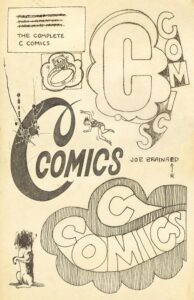
Joe Brainard, The Complete C Comics
NYRB, November 18
In the ’60s, writer and artist Joe Brainard collaborated with some of his friends—friends like Frank O’Hara, Ted Berrigan, John Ashbery, Kenneth Koch, Peter Schjeldahl, Anne Waldman, and Ron Padgett—to collaborate with him on comic strips. They wrote; he drew. These were more or less lost to time until now, when they have been collected for all in an accessible volume that comes complete with a foreword from Padgett and an essay by comics historian Bill Kartalopolous. Cool. –ET
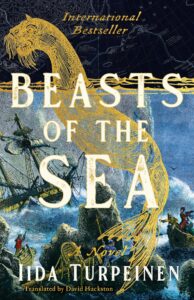
Iida Turpeinen, Beasts of the Sea
Little, Brown, November 18
A centuries-spanning epic about our relationship to the natural world centered around a fascinating marine mammal? Yes, please! Beasts of the Sea is a novel set over the course of three centuries that tracks the relationship between humans and the now-extinct Steller’s sea cow. It’s also about the legacy of so-called “discovery,” the cost of progress, and the ways the world does—and doesn’t—change. I love historical novels that grapple with very specific and underrepresented parts of history (sorry to historical fiction about, like, “the war”), so I’m really looking forward to this detailed, thoughtful novel. –MC
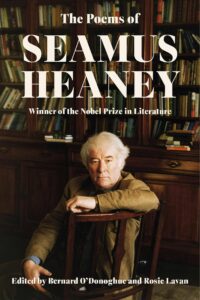
Seamus Heaney, ed. Bernard O’Donoghue and Rosie Lavan, The Poems of Seamus Heaney
FSG, November 18
I learned to love poetry through studying Seamus Heaney and Emily Dickinson side by side in school, so I’ll always have a soft spot for Heaney’s work. I also love a poetry collection that’s also a doorstopper? There’s something (delightfully) ridiculous about owning such an enormous book of verse. –OS
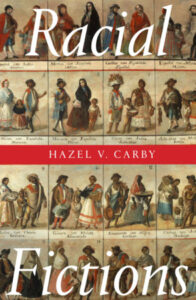
Hazel V. Carby, Racial Fictions
Verso, November 25
Carby’s historical memoir, Imperial Intimacies: A Tale of Two Islands, really blew my mind last year. This fall, the formidable African American Studies scholar has another genre-twisting exploration coming for an indie shelf near you. A work of theory, history, and criticism, Racial Fictions situates domestic American “racial struggles” in a global context, invoking the long arm of colonialism and picking up a Black intellectual tradition right where DuBois left off. A sure-to-be engaging work from one of our best thinkers. –BA
December
Olga Tokarczuk, tr. Antonia Lloyd-Jones, House of Day, House of Night
Riverhead, December 2
There’s nothing by Olga Tokarczuk that I won’t read, but this new book is high on my TBR pile. In a remote Polish village, a woman encounters the area’s few inhabitants—the drunk who shares a body with a bird, another who has nightmares from a newly discovered planet, the Germans who have recently called the land their own. I can’t wait for this “constellation novel.” –EF
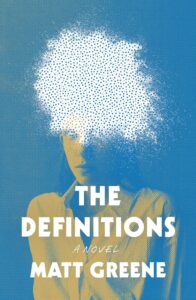
Matt Greene, The Definitions
Henry Holt, December 2
A novel about identity and oppression, set in a dystopian rehab center after a strange plague strips people of themselves. The Center at the heart of the book helps people rediscover and rebuild their names and identities through rigid hierarchies and old DVDs with characters named “Maria, Chandler, Chino, Gunther”—a little too similar to how I’ve also rebuilt my personality post-pandemic. Greene’s first novel Ostrich had a lot of humor, and I’m looking forward to more of his wit amongst the darker threads in this forthcoming book. –JF
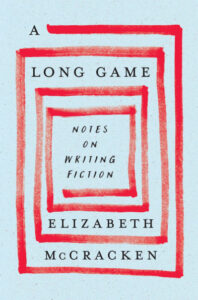
Elizabeth McCracken, A Long Game: Notes on Writing Fiction
Ecco, December 2
McCracken is a brilliant writer and, as I’ve heard from many who have worked with her, a brilliant teacher as well. In this craft book, we all get the benefit of her years of teaching—How does one face the blank page? Move a character around a room? Deal with time? Undertake revision? McCracken notes that “Writing is a long game… What matters is that you learn to get work done in the way that is possible for you, through consistency or panic. Through self-recrimination or self-forgiveness: every life needs both.” For readers who want a lesson in craft or to learn about the life of a working artist, this book will be essential. –EF
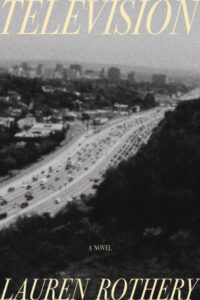
Lauren Rothery, Television
Ecco, December 2
Blame it on having read The City and the Pillar too recently, but lately I’ve been enjoying fiction featuring aging film stars making odd choices and not quite knowing why. A protagonist with shallow self-knowledge setting forth to take a blowtorch to their life is one of the more fun literary rides a reader can go on. If nothing else, the marketing copy for this debut promises a “profoundly modern style”, and I’m curious to learn what, exactly, that entails. –CK
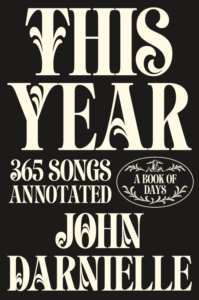
John Darnielle, This Year: 365 Songs Annotated: A Book of Days
MCD, December 2
If Bob Dylan can win a Nobel Prize than we can call John Darnielle one of the best short story writers of the last 30 years. The man behind The Mountain Goats, Darnielle’s songs are perfect narrative jewels that navigate all the longing, absurdity, desire, regret, anger, joy, and wonder of this life, refracted through a very particular Gen X sensibility. But you can now read them for yourself, on the page (with commentary from the man himself). –JD
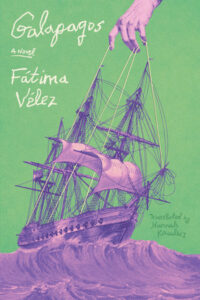
Fátima Vélez, tr. Hannah Kauders, Galapagos
Astra House, December 2
A group of artists all dying of AIDS set off on a strange sea voyage, headed for the Galapagos. It sounds like a macabre riff on the The Decameron at sea, promising “a journey of decomposition” and wonders both textual and spiritual. Certainly sounds like nothing else I’ve ever encountered, and for that I’m excited. –DB
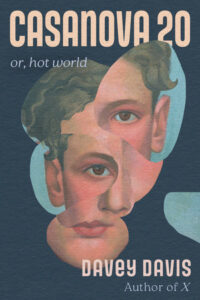
Davey Davis, Casanova 20: Or, Hot World
Catapult, December 2
Davey Davis’s previous novel, X, has proven to be uncannily prescient in its descriptions of a totalitarian American government forcing out undesirables through a mixture of forced deportations and encouraging self-deportations. Going off of their predictive powers, it would be unwise—and, based on the neo-noir pleasures of X, depriving yourself of a lot of fun—to miss out on this one. –CK
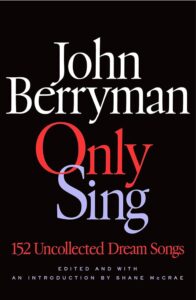
John Berryman, ed. Shane McCrae, Only Sing: 152 Uncollected Dream Songs
FSG, December 9
Dream Songs has been out in the world for 61 years: 61 years of entrancing, captivating, disturbing, affecting poem-songs. John Berryman released that first batch, then another batch, and now here comes 152 never before published poems, released upon the world like a cloud of white doves. New poems to memorize, to ingest, to hold, to float upon. Life, friends, is boring except for when we have a new collection of John Berryman to carry us through. –JH
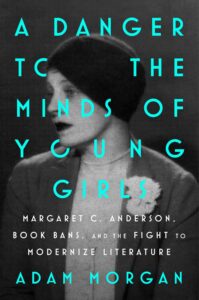
Adam Morgan, A Danger to the Minds of Young Girls
Atria/One Signal Publishers, December 9
A book covering the historical precedent for detractors labeling any publication of sexual or queer-related content “obscene” is going to be extraordinarily relevant in 2025, and that’s probably the more sensible reason to be excited for A Danger to the Minds of Young Girls. What can’t be overstated, however, is the implication that Ulysses is a form of forbidden chick lit. Looking forward to this book forever changing the reputation of Ulysses to that effect, and elevating the story of one of its earliest proponents. –CK, as recommended in our first-half of 2025 list









